新概念学单词:容易误解的英语词汇
高中英语易混淆词汇
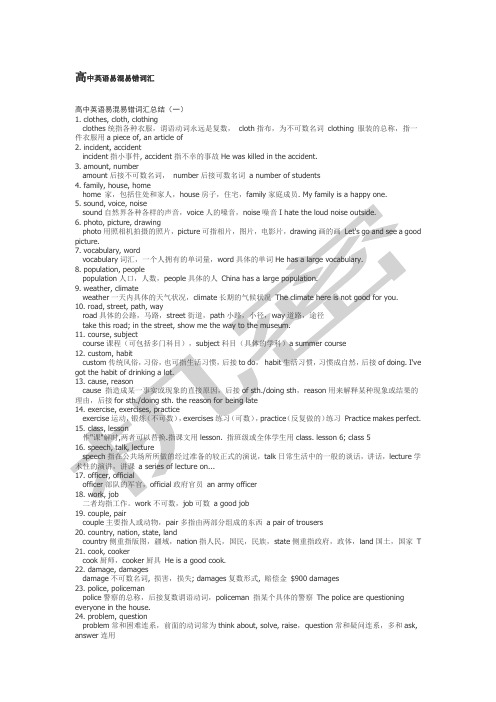
高中英语易混易错词汇高中英语易混易错词汇总结(一)1. clothes, cloth, clothingclothes统指各种衣服,谓语动词永远是复数,cloth指布,为不可数名词clothing 服装的总称,指一件衣服用a piece of, an article of2. incident, accidentincident指小事件, accident指不幸的事故He was killed in the accident.3. amount, numberamount后接不可数名词,number后接可数名词a number of students4. family, house, homehome 家,包括住处和家人,house房子,住宅,family家庭成员. My family is a happy one.5. sound, voice, noisesound自然界各种各样的声音,voice人的嗓音,noise噪音I hate the loud noise outside.6. photo, picture, drawingphoto用照相机拍摄的照片,picture可指相片,图片,电影片,drawing画的画Let's go and see a good picture.7. vocabulary, wordvocabulary词汇,一个人拥有的单词量,word具体的单词He has a large vocabulary.8. population, peoplepopulation人口,人数,people具体的人China has a large population.9. weather, climateweather一天内具体的天气状况,climate长期的气候状况The climate here is not good for you.10. road, street, path, wayroad具体的公路,马路,street街道,path小路,小径,way道路,途径take this road; in the street, show me the way to the museum.11. course, subjectcourse课程(可包括多门科目),subject科目(具体的学科)a summer course12. custom, habitcustom传统风俗,习俗,也可指生活习惯,后接to do,habit生活习惯,习惯成自然,后接of doing. I've got the habit of drinking a lot.13. cause, reasoncause 指造成某一事实或现象的直接原因,后接of sth./doing sth,reason用来解释某种现象或结果的理由,后接for sth./doing sth. the reason for being late14. exercise, exercises, practiceexercise运动,锻炼(不可数),exercises练习(可数),practice(反复做的)练习Practice makes perfect.15. class, lesson作"课"解时,两者可以替换.指课文用lesson. 指班级或全体学生用class. lesson 6; class 516. speech, talk, lecturespeech指在公共场所所做的经过准备的较正式的演说,talk日常生活中的一般的谈话,讲话,lecture学术性的演讲,讲课a series of lecture on...17. officer, officialofficer部队的军官,official政府官员an army officer18. work, job二者均指工作。
容易混淆的英语单词
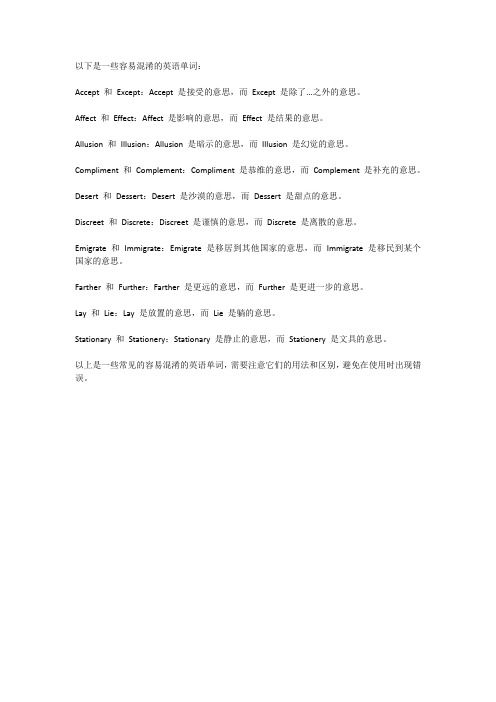
以下是一些容易混淆的英语单词:
Accept 和Except:Accept 是接受的意思,而Except 是除了...之外的意思。
Affect 和Effect:Affect 是影响的意思,而Effect 是结果的意思。
Allusion 和Illusion:Allusion 是暗示的意思,而Illusion 是幻觉的意思。
Compliment 和Complement:Compliment 是恭维的意思,而Complement 是补充的意思。
Desert 和Dessert:Desert 是沙漠的意思,而Dessert 是甜点的意思。
Discreet 和Discrete:Discreet 是谨慎的意思,而Discrete 是离散的意思。
Emigrate 和Immigrate:Emigrate 是移居到其他国家的意思,而Immigrate 是移民到某个国家的意思。
Farther 和Further:Farther 是更远的意思,而Further 是更进一步的意思。
Lay 和Lie:Lay 是放置的意思,而Lie 是躺的意思。
Stationary 和Stationery:Stationary 是静止的意思,而Stationery 是文具的意思。
以上是一些常见的容易混淆的英语单词,需要注意它们的用法和区别,避免在使用时出现错误。
英语中容易歧义的词语

容易歧义的词语sporting house 妓院(不是“体育室”)dead president 美钞(上印有总统头像)(并非“死了的总统”)lover 情人(不是“爱人”)busboy 餐馆勤杂工(不是“公汽售票员”)busybody 爱管闲事的人(不是“大忙人”)dry goods (美)纺织品;(英)谷物(不是“干货”)heartman 换心人(不是“有心人”)mad doctor 精神病科医生(不是“发疯的医生”)eleventh hour 最后时刻(不是“十一点”)blind date (由第三者安排的)男女初次会面(并非“盲目约会”或“瞎约会”)personal remark 人身攻击(不是“个人评论”)sweet water 淡水(不是“糖水”或“甜水”)confidence man 骗子(不是“信得过的人”)criminal lawyer 刑事律师(不是“犯罪的律师”)service station 加油站(不是“服务站”)rest room 厕所(不是“休息室”)dressing room 化妆室(不是“试衣室”或“更衣室”)horse sense 常识(不是“马的感觉”)capital idea 好主意(不是“资本主义思想”)familiar talk 庸俗的交谈(不是“熟悉的谈话”)black tea 红茶(不是“黑茶”)black art 妖术(不是“黑色艺术”)black stranger 完全陌生的人(不是“陌生的黑人”)white coal (作动力来源用的)水(不是“白煤”)white man 忠实可靠的人(不是“皮肤白的人”)yellow book 黄皮书(法国政府报告书,以黄纸为封)(不是“黄色书籍”)red tape 官僚习气(不是“红色带子”)green hand 新手(不是“绿手”)blue stocking 女学者、女才子(不是“蓝色长统袜”)China policy 对华政策(不是“中国政策”)Chinese dragon 麒麟(不是“中国龙”)American beauty 一种玫瑰,名为“美国丽人”(不是“美国美女”)English disease 软骨病(不是“英国病”)Indian summer 愉快宁静的晚年(不是“印度的夏日”)Greek gift 害人的礼品(不是“希腊礼物”)Spanish athlete 吹牛的人(不是“西班牙运动员”)French chalk 滑石粉(不是“法国粉笔”)pull one's leg 开玩笑(不是“拉后腿”)in one's birthday suit 赤身裸体(不是“穿着生日礼服”)eat one's words 收回前言(不是“食言”)an apple of love 西红柿(不是“爱情之果”)handwriting on the wall 不祥之兆(不是“大字报”)bring down the house 博得全场喝彩(不是“推倒房子”)have a fit 勃然大怒(不是“试穿”)make one's hair stand on end 令人毛骨悚然—恐惧(不是“令人发指——气愤”)be taken in 受骗,上当(不是“被接纳”)think a great deal of oneself 高看或看重自己(不是“为自己想得很多”)pull up one's socks 鼓起勇气(不是“提上袜子”)have the heart to do (用于否定句)忍心做……不是“有心做”或“有意做”)What a shame! 多可惜!真遗憾!(不是“多可耻”)You don't say! 是吗!(不是“你别说”)You can say that again! 说得好!(不是“你可以再说一遍”)I haven't slept better. 我睡得好极了。
易混淆单词150小学英语
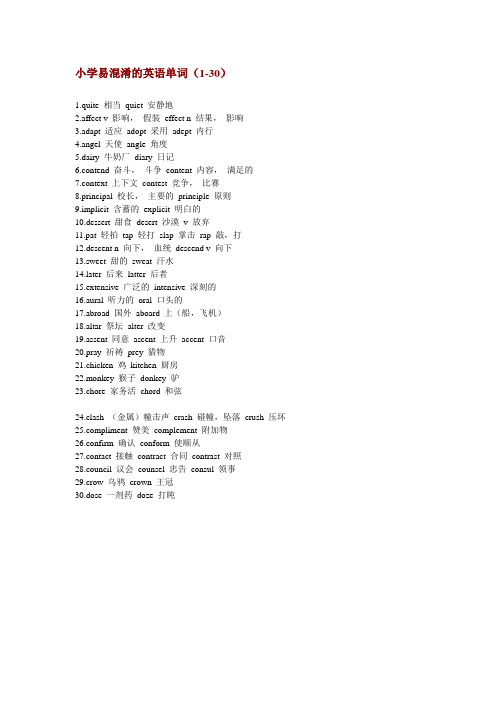
小学易混淆的英语单词(1-30)1.quite 相当quiet 安静地2.affect v 影响,假装effect n 结果,影响3.adapt 适应adopt 采用adept 内行4.angel 天使angle 角度5.dairy 牛奶厂diary 日记6.contend 奋斗,斗争content 内容,满足的7.context 上下文contest 竞争,比赛8.principal 校长,主要的principle 原则9.implicit 含蓄的explicit 明白的10.dessert 甜食desert 沙漠v 放弃11.pat 轻拍tap 轻打slap 掌击rap 敲,打12.descent n 向下,血统descend v 向下13.sweet 甜的sweat 汗水ter 后来latter 后者15.extensive 广泛的intensive 深刻的16.aural 听力的oral 口头的17.abroad 国外aboard 上(船,飞机)18.altar 祭坛alter 改变19.assent 同意ascent 上升accent 口音20.pray 祈祷prey 猎物21.chicken 鸡kitchen 厨房22.monkey 猴子donkey 驴23.chore 家务活chord 和弦24.clash (金属)幢击声crash 碰幢,坠落crush 压坏pliment 赞美complement 附加物26.confirm 确认conform 使顺从27.contact 接触contract 合同contrast 对照28.council 议会counsel 忠告consul 领事29.crow 乌鸦crown 王冠30.dose 一剂药doze 打盹表格 131)confirm 确认conform 使顺从32)contact 接触contract 合同contrast 对照33)council 议会counsel 忠告consul 领事34)crow 乌鸦crown 王冠clown 小丑cow 牛35)dose 一剂药doze 打盹36)drawn draw 过去分词drown 溺水37)emigrant 移民到国外immigrant 从某国来的移民38)excess n 超过exceed v超过excel 擅长39)hotel 青年旅社hostel 旅店40)latitude 纬度altitude 高度gratitude 感激41)immoral 不道德的immortal 不朽的42)lone 孤独的alone 单独的lonely 寂寞的43)mortal 不死的metal 金属mental 神经的medal 勋章model 模特meddle 玩弄44)scare 惊吓scarce 缺乏的45)drought 天旱draught 通风,拖拉draughts (英)国际跳棋47)assure 保证ensure 使确定insure 保险48)except 除外expect 期望accept 接受excerpt 选录exempt 免除49)floor 地板flour 面粉50)incident 事件accident 意外51)inspiration 灵感aspiration 渴望[NextPage] 52)march 三月,前进match 比赛53)patent 专利potent 有力的potential 潜在的54)police 警察policy 政策politics 政治55)protest 抗议protect 保护56)require 需要inquire 询问enquire 询问acquire 获得57)vision 视觉version 译本 58)delicate 微妙的dedicate 献身59)idle 空闲的idol 偶像60)induce 促使,劝诱dedue 推测reduce 减少seduce 诱使pse 流逝elapse 消逝eclipse 日食62.rude 粗鲁的crude 天然的63.resource 资源recourse 求援64.stripe 条纹strip 条trip 旅行65.area 区域era 时代66.badge 徽章bandage 绷带67)revenge 报仇avenge 为……报仇68)story 故事storey 楼层store 商店69)strike 打stick 坚持strict 严格的70)expand 扩张expend 花费extend 延长71)commerce 商业commence 开始72)through 通过thorough 彻底的(al)though 尽管thought think 过去分词73)purpose 目的suppose 假设propose 建议74)expect 期望respect 尊敬aspect 方面inspect 视察suspect 怀疑75)glide 滑翔slide 使滑行slip 跌落[NextPage]76)steal 偷steel 钢77)strive 努力stride 大步走78)allusion 暗示illusion 幻觉delusion 错觉elusion 逃避79)prospect 前景perspective 透视法80)stationery 文具stationary 固定的81)loose 松的lose 丢失loss n 损失lost lose过去式82)amend 改正,修正emend 校正83)amoral unmoral immoral 同义不道德的84)capitol 大厦capital 首都85)casual 随便的causal 表原因的86)extend 延伸extent 长度extant 现存的87)inability 没能力disability 残疾88)personnel 人事personal 个人的89)statue 塑像statute 法令stature 身长status 地位90)widow 寡妇window 窗户91)socks 短袜stockings 长筒袜92)tax 税taxi 出租93)definite 不定的infinite 无限的94)grim 严酷的grime 污点95)crayon 蜡笔canyon 山谷96)recent 最近resent 生气97)phrase 短语phase 阶段98)mission 使命emission 散发,发射mansion 大厦99)vision 视觉version 译本100)gasp 上气不接下气grasp 抓住101)delicate 微妙的dedicate 献身[NextPage] 101)idle 空闲的idol 偶像102)induce 促使,劝诱deduce 推测reduce 减少seduce 诱使103)lapse 流逝elapse 消逝eclipse 日食104)rude 粗鲁的crude 天然的105)source 水源sauce 酱油saucer 茶托resource 资源recourse 求援106)sled (儿童)雪橇sledge 雪橇107)stripe 条纹strip 条trip 旅行108)vocation 职业vacation 假期evocation 召集revocation 撤回109)ardor 热情adore 崇拜adorn 装饰110)area 区域era 时代111)resemble 象…… assemble v 集合,装配assembly n 集合,装配112)assume 假定resume 恢复113)attain 达到obtain 获得abstain 放弃114)award 授予reward 奖赏115)baggage (American English)luggage 行李116)badge 徽章bandage 绷带117)blade 刀刃bald 秃的bold 大胆118)bloom 开花blossom 开花(结果实)bosom 胸口119)blush 脸红flush 发红(脸)120)bride 新娘bribe 贿赂121)growl 咆哮howl 狼叫122)depress 使沮丧suppress 镇压oppress 压迫123)dime 一角dim 暗淡的124)dizzy 眼花缭乱dazzle 使眼花125)brown 褐色brow 眼眉blow 打击[NextPage]126)bullet 子弹bulletin 公告127)carton 纸板盒cartoon 动画128)chivalry 骑士精神cavalry 骑兵队129)collar 领子cellar 地窖color 颜色130)vanish 消失evanish 使消失131)intrude 入侵extrude 逐出detrude 推下132)contort 扭弯distort 弄弯retort 反驳133)eminent 杰出的imminent 逼近的134)decline 下降recline 放置incline 倾斜135)exclaim 呼喊proclaim 宣布acclaim 欢呼declaim 朗诵136)edict 法令indict 控告137)perfuse 泼洒profuse 浪费的138)reject 拒绝eject 逐出inject 注射deject 使沮丧139)literacy 识字literary 文学的literature 文学literal 文字的140)median 中央的,中线的medium 媒体141)expel 驱逐repel 反击impel 推动dispel 驱散142)rip 撕ripe 熟的143)wench 绞车wrench 扭伤144)confidant 知己confident 有信心的145)dine 吃饭diner 吃饭人dinning n 吃饭dinner 晚饭146)dreg 渣滓drag 拖拉147)faint 失去知觉feint 佯攻148)imprudence 轻率impudence 无耻149)specie 硬币species 种类150)hanger 钩子hangar 棚厂hunger 饥饿。
初中基础单词容易混淆的词汇
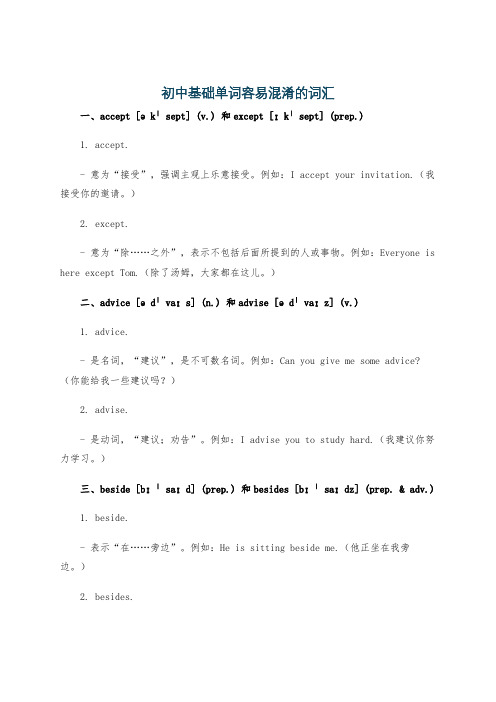
初中基础单词容易混淆的词汇一、accept [əkˈsept] (v.) 和except [ɪkˈsept] (prep.)1. accept.- 意为“接受”,强调主观上乐意接受。
例如:I accept your invitation.(我接受你的邀请。
)2. except.- 意为“除……之外”,表示不包括后面所提到的人或事物。
例如:Everyone is here except Tom.(除了汤姆,大家都在这儿。
)二、advice [ədˈvaɪs] (n.) 和advise [ədˈvaɪz] (v.)1. advice.- 是名词,“建议”,是不可数名词。
例如:Can you give me some advice?(你能给我一些建议吗?)2. advise.- 是动词,“建议;劝告”。
例如:I advise you to study hard.(我建议你努力学习。
)三、beside [bɪˈsaɪd] (prep.) 和besides [bɪˈsaɪdz] (prep. & adv.)1. beside.- 表示“在……旁边”。
例如:He is sitting beside me.(他正坐在我旁边。
)2. besides.- 作介词时,意为“除……之外(还有)”;作副词时,意为“而且;此外”。
例如:Besides English, we also learn French.(除了英语,我们还学法语。
);I don't like this dress. Besides, it's too expensive.(我不喜欢这条裙子。
而且,它太贵了。
)四、borrow [ˈbɒrəʊ] (v.) 和lend [lend] (v.)1. borrow.- 意为“借入”,常用搭配borrow sth. from sb.。
例如:I borrow a book from the library.(我从图书馆借了一本书。
高中英语易混易错词汇辨析大全
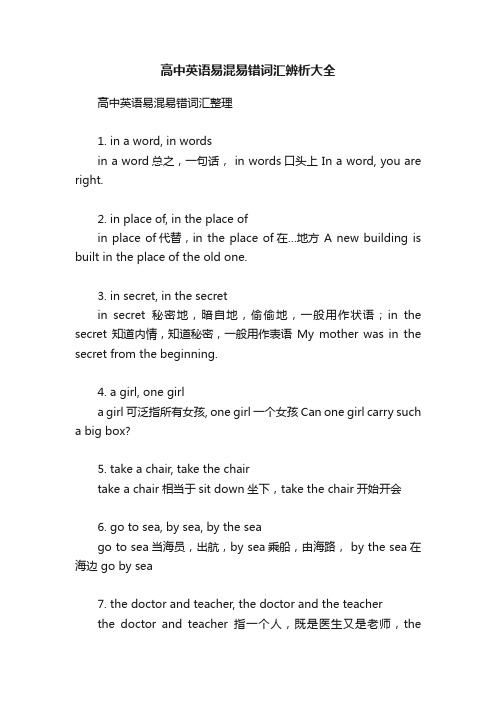
高中英语易混易错词汇辨析大全高中英语易混易错词汇整理1. in a word, in wordsin a word总之,一句话, in words口头上 In a word, you are right.2. in place of, in the place ofin place of代替,in the place of在…地方 A new building is built in the place of the old one.3. in secret, in the secretin secret秘密地,暗自地,偷偷地,一般用作状语;in the secret知道内情,知道秘密,一般用作表语My mother was in the secret from the beginning.4. a girl, one girla girl可泛指所有女孩, one girl一个女孩 Can one girl carry such a big box?5. take a chair, take the chairtake a chair相当于sit down坐下,take the chair开始开会6. go to sea, by sea, by the seago to sea当海员,出航,by sea乘船,由海路, by the sea在海边 go by sea7. the doctor and teacher, the doctor and the teacherthe doctor and teacher指一个人,既是医生又是老师,thedoctor and the teacher两个人,一个医生和一个老师the doctor and teacher is8. in office, in the officein office在职的,in the office在办公室里 He is in office, not out of office.9. in bed, on the bedin bed卧在床上,on the bed在床上 The book is on the bed. He is ill in bed.10. in charge of, in the charge ofin charge of管理,负责照料, in the charge of由……照料 He is in charge of the matter. The matter is in the charge of her.11. in class, in the classin class在课上,in the class在班级里 He is the best student in the class.12. on fire, on the fireon fire**,on the fire在火上 Put the food on the fire. The house is on fire.13. out of question, out of the questionout of question毫无疑问的,out of the question不可能的14. a second, the seconda second又一,再一,the second第…… He won the sec ond prize.15. by day, by the dayby day白天,by the day按天计算 The workers are paid by the day.16. the people, a peoplethe people指人,a people指民族The Chinese is a peace-loving people.17. it, oneit同一物体,one同类不同一 I lost my pen. I have to buy a new one.18. that, thisthat指代上文所提到的,this导出下文所要说的 I was ill. That's why…19. none, nothing, no onenone强调有多少,nothing, no one强调有没有,nothing指物,no one指人--- How many…/How much…? --- None.20. anyone, any oneanyone指人,不能接of,any one指人物均可,可接of any one of you21. who, whatwho指姓名或关系,what指职业或地位 What is your dad? He is a teacher.22. what, whichwhat的选择基础是无**的,which在一定范围内进行选择 Whichdo you prefer, bananas or apples?23. other, anotherother后接名词复数,another后接名词单数other students, another student24. not a little, not a bitnot a little非常,not a bit一点也不 I'm not a bit tired. 我一点儿也不累。
新概念英语二容易混淆的词
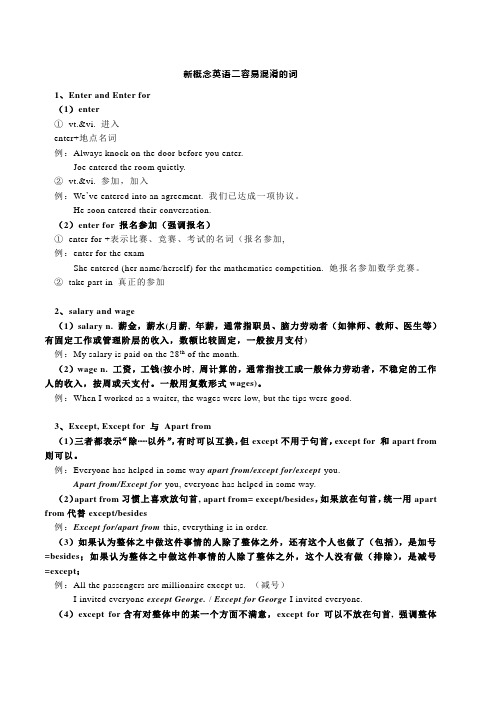
新概念英语二容易混淆的词1、Enter and Enter for(1)enter①vt.&vi. 进入enter+地点名词例:Always knock on the door before you enter.Joe entered the room quietly.②vt.&vi. 参加,加入例:We’ve entered into an agreement. 我们已达成一项协议。
He soon entered their conversation.(2)enter for 报名参加(强调报名)①enter for +表示比赛、竞赛、考试的名词(报名参加,例:enter for the examShe entered (her name/herself) for the mathematics competition. 她报名参加数学竞赛。
②take part in 真正的参加2、salary and wage(1)salary n. 薪金,薪水(月薪, 年薪,通常指职员、脑力劳动者(如律师、教师、医生等)有固定工作或管理阶层的收入,数额比较固定,一般按月支付)例:My salary is paid on the 28th of the month.(2)wage n. 工资,工钱(按小时, 周计算的,通常指技工或一般体力劳动者,不稳定的工作人的收入,按周或天支付。
一般用复数形式wages)。
例:When I worked as a waiter, the wages were low, but the tips were good.3、Except, Except for 与Apart from(1)三者都表示“除⋯⋯以外”,有时可以互换,但except不用于句首,except for 和apart from 则可以。
例:Everyone has helped in some way apart from/except for/except you.Apart from/Except for you, everyone has helped in some way.(2)apart from习惯上喜欢放句首, apart from= except/besides,如果放在句首,统一用apart from代替except/besides例:Except for/apart from this, everything is in order.(3)如果认为整体之中做这件事情的人除了整体之外,还有这个人也做了(包括),是加号=besides;如果认为整体之中做这件事情的人除了整体之外,这个人没有做(排除),是减号=except;例:All the passengers are millionaire except us. (减号)I invited everyone except George. / Except for George I invited everyone.(4)except for含有对整体中的某一个方面不满意,except for 可以不放在句首, 强调整体当中某一方面除外,剩下的整体都不错例:The article is very good except for his handwriting.Except for his height, he is very excellent.4、Which of,Either of,Neigher of与Both of(1)上面这些短语都可用于指两个人或两件事either of 两者当中的任何一个neither of 两者都不which of 那一个both of 两者都(2)当询问在两个或更多的人或事物中偏爱哪一个或选择哪一个时,可用which例:I like both of these bags. Which of the two do you prefer?(3)either与neither都是对两个人或物而言(后接单数名词)。
中考易拼错单词

中考易拼错单词
一、accommodation [əˌkɒməˈdeɪʃn],名词。
1. 含义:住宿;膳宿。
2. 易错点:容易少写一个“m”或者把“c”和“m”的顺序弄混。
二、embarrassed [ɪmˈbærəst],形容词。
1. 含义:感到尴尬的;难堪的。
2. 易错点:容易写成“embarrass”(动词)或者拼写时少字母,如写成“embarased”。
三、separate。
- 作动词 [ˈsepəreɪt]:分离;分开。
- 作形容词 [ˈseprət]:单独的;分开的。
1. 易错点:作动词时,容易忘记“a”后面的“r”;作形容词时,容易与动词形式混淆。
四、believe [bɪˈliːv],动词。
1. 含义:相信;认为。
2. 易错点:容易写成“beleive”,将“ie”顺序弄反。
五、receive [rɪˈsiːv],动词。
1. 含义:收到;接到。
2. 易错点:容易写成“recieve”,把“ei”顺序写错。
六、necessary [ˈnesəsəri],形容词。
1. 含义:必要的;必需的。
2. 易错点:容易写成“neccessary”,多写一个“c”。
七、government [ˈɡʌvənmənt],名词。
1. 含义:政府。
2. 易错点:容易写成“goverment”,少写一个“n”。
初中英语易混淆单词

初中英语易混淆单词1:pronounce 发。
.。
...。
音,pronunciation 发音2:hard adj.& adv。
硬的;辛苦地,努力地hardly adv.几乎不3:change v. 改变chance n。
机会4:feel (felt)v. 感觉,感到fall(fell)v. 落下5:sleepy (feel sleepy)adj。
困倦的asleep (fall asleep)adj. 睡着的6:different adj。
不同的difference n。
不同点7:important adj。
重要的importance n。
:重要性8:confident adj. 自信的confidence n。
想、自信9:distant adj。
远的distance n.距离10:appear v。
出现appearance n。
出现,外貌11:difficult adj.难的difficulty n。
难点12:expect v. 期望except prep。
除。
.。
......之外accept v。
接收13:though adv.$conj。
尽管;虽然through adv。
&prep 穿过thought n。
想法v。
think 的过去式14:pass v.经过,通过past adj。
过去的n. 过去15:sometimes 有时some times 几次sometime 某个时候some time 一段时间16:shake v。
动摇snake n。
蛇snack n.小吃17:quite adv。
相当quiet adj.安静的quick adj。
快的18:affect v.影响effect n。
结果,影响effort n.努力19:dessert n。
甜食desert n.沙漠v。
放弃20:costume n。
服装custom n.习惯21:chicken n.鸡kitchen n。
新概念英语单词第一册

新概念英语单词第一册一、A开头单词。
1. abroad [əˈbrɔːd] adv. 在国外;到国外。
2. across [əˈkrɒs] prep. 横过;穿过。
3. active [ˈæktɪv] adj. 积极的。
4. actor [ˈæktə(r)] n. 男演员。
5. actress [ˈæktrəs] n. 女演员。
6. address [əˈdres] n. 地址。
7. aeroplane [ˈeərəpleɪn] n. 飞机。
二、B开头单词。
1. bad [bæd] adj. 坏的;严重的。
2. bag [bæɡ] n. 包;提包。
3. bank [bæŋk] n. 银行;河岸。
4. bar [bɑː(r)] n. 酒吧;条;棒。
5. basket [ˈbɑːskɪt] n. 篮子。
6. bath [bɑːθ] n. 洗澡;浴室;澡盆。
7. bathroom [ˈbɑːθruːm] n. 浴室;盥洗室。
8. be [biː] v. 是(原形)9. bean [biːn] n. 豆;蚕豆。
10. bear [beə(r)] n. 熊;v. 忍受;承担。
11. bed [bed] n. 床。
12. bedroom [ˈbedruːm] n. 卧室。
13. bee [biː] n. 蜜蜂。
14. beef [biːf] n. 牛肉。
15. beer [bɪə(r)] n. 啤酒。
16. before [bɪˈfɔː(r)] prep. 在……之前;adv. 以前。
17. begin [bɪˈɡɪn] v. 开始。
18. beginning [bɪˈɡɪnɪŋ] n. 开始;开端。
19. behind [bɪˈhaɪnd] prep. 在……后面。
20. believe [bɪˈliːv] v. 相信;认为。
21. bell [bel] n. 钟;铃。
(完整版)易混淆的100组单词
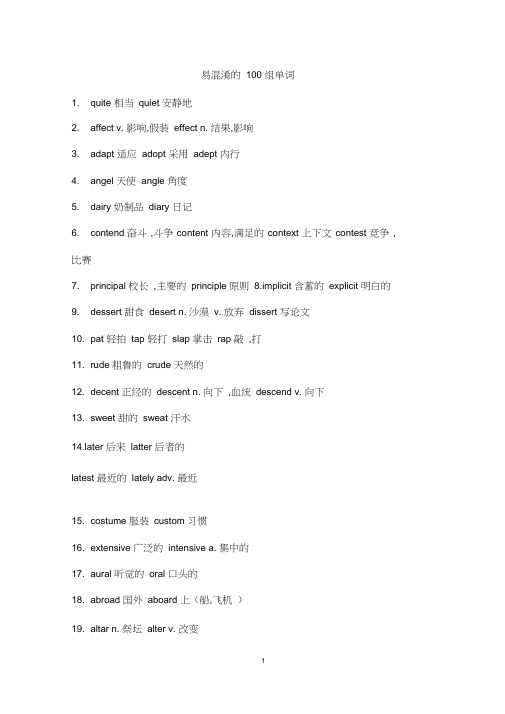
易混淆的100 组单词1. quite 相当quiet 安静地2. affect v. 影响,假装effect n. 结果,影响3. adapt 适应adopt 采用adept 内行4. angel 天使angle 角度5. dairy 奶制品diary 日记6. contend 奋斗,斗争content 内容,满足的context 上下文contest 竞争,比赛7. principal 校长,主要的principle 原则8.implicit 含蓄的explicit 明白的9. dessert 甜食desert n. 沙漠v. 放弃dissert 写论文10. pat 轻拍tap 轻打slap 掌击rap 敲,打11. rude 粗鲁的crude 天然的12. decent 正经的descent n. 向下,血统descend v. 向下13. sweet 甜的sweat 汗水ter 后来latter 后者的latest 最近的lately adv. 最近15. costume 服装custom 习惯16. extensive 广泛的intensive a. 集中的17. aural 听觉的oral 口头的18. abroad 国外aboard 上(船,飞机)19. altar n. 祭坛alter v. 改变20. assent 同意ascent 上升accent 口音21. champion 冠军champagne 香槟酒campaign 战役22. source 来源,水源sauce 酱油saucer 茶resource 资源recourse 求援23. precede 领先proceed 进行,继续24. pray 祈祷prey 猎物25. chicken 鸡kitchen 厨房26. monkey 猴子donkey 驴27. chore 家务活chord 和弦cord 细绳28. cite 引用site 场所sight 视觉29. clash (金属)碰撞声crash 撞碎,坠落crush 压坏30. compliment 赞美complement 补足物31. confirm 确认conform 符合,使顺从32. contact 接触contract 合同contrast 对照33. vocation 职业vacation 假期evocation 唤起revocation 撤回34. council 议会counsel 忠告consul 领事35. crow 乌鸦crown 王冠clown 小丑cow 牛36. dose 一剂(药) doze 打盹37. drawn draw 过去分词drown 溺水38. emigrant 移民到国外(迁出) immigrant 从某国来的移民(迁入)39. excess n. 超过exceed v. 超过excel v. 擅长40. hotel 旅馆hostel 旅社,招待所(尤指青年旅社) titude 纬度altitude 高度gratitude 感激42.immoral 不道德的immortal 不朽的43.lone 孤独alone 单独的lonely 寂寞的44. area 区域era 时代45. metal 金属mental 精神的medal 勋章model 模特meddle 管闲事46. scare 惊吓scarce 缺乏的47. drought 天旱draught 拖拉的draughts (英)国际跳棋48. assure 保证in sure 给…保险49. except 除外expect 期望accept 接受excerpt 摘录50. floor 地板flour 面粉51.incident 事件accident 意外52.inspiration 灵感aspiration 渴望53. march 三月,前进match 比赛54. patent 专利potent 强有力的potential 潜在的55. assume 假定resume 简历,重新开始56. police 警察policy 政策politics 政治57. protest 抗议protect 保护58. require 需要inquire 询问enquire 询问acquire 获得59. revenge 报仇avenge 营… 报仇60. story 故事storey 楼层store 商店61. strike 打stick 坚持strict 严格的62. expand 扩张expend 花费extend 延长63. commerce 商业commence 开始64. through 通过thorough 彻底的though 尽管thought think 过去分词65. purpose 目的suppose 假设propose 建议66. resemble 类似assemble v. 集台,装配assembly n 集台,装配67. expect 期望respect 尊敬aspect 方面inspect 视察suspect 怀疑68. glide 滑翔slide 使滑行slip 跌落69. steal 偷steel 钢70. strive 努力stride 大步走71. allusion 暗示illusion 幻觉delusion 错觉elusion 逃避72. prospect 前景perspective 透视73. stationery 文具stationary 固定的74.loose 松的lose 丢失loss n. 损失lost lose 的过去式75. amend 改正, 修正emend 修订76. capitol 美国国会大厦capital 首部77. attain 达到obtain 获得abstain 放弃78. casual 随便的causal 表原因的79. extend 延伸extent 长度extant 现存的80.inability 无能力disability 残疾81. personnel 人事部门personal 个人的82. statue 塑像statute 法令stature 身高status 地位83. widow 寡妇window 窗户84. socks 短袜stockings 长筒袜85. tax 税taxi 出租86. definite 确切的infinite 无限的87. grim 冷酷的grime 污点88. award 授予reward 奖赏89. crayon 蜡笔canyon 山谷90. recent 最近resent 生气91. phrase 短语phase 阶段92. mission 使命emission 散发.发射mansion 大厦93. vision 视觉version 译本94. gasp 喘气,气喘吁吁地说grasp 抓住95. delicate 微妙的dedicate 献身96.idle 空闲的idol 偶像97.induce 诱导deduce 推测reduce 减少seduce 诱使pse 流逝elapse 消逝eclipse 日食99.bloom 开花blossom 开花(结果实) bosom 胸100.bride 新娘bribe 贿赂。
新概念英语词汇
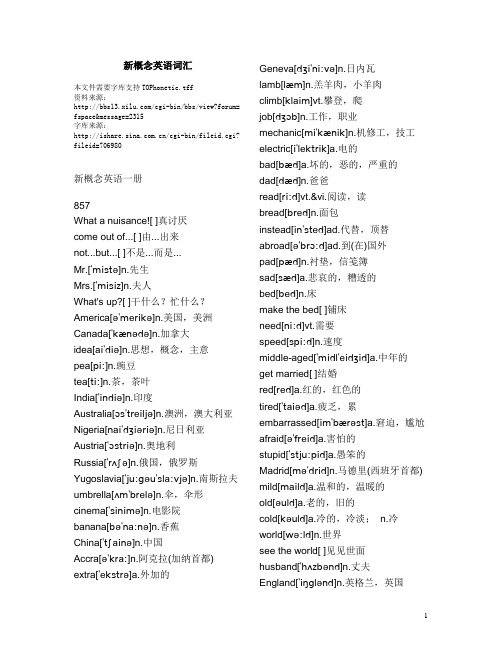
新概念英语词汇本文件需要字库支持TOPhonetic.tff资料来源:/cgi-bin/bbs/view?forum= fspace&message=2315字库来源:/cgi-bin/fileid.cgi? fileid=706980新概念英语一册857What a nuisance![ ]真讨厌come out of...[ ]由...出来not...but...[ ]不是...而是...Mr.['mist4]n.先生Mrs.['misiz]n.夫人What's up?[ ]干什么?忙什么?America[4'merik4]n.美国,美洲Canada['k1n4d4]n.加拿大idea[ai'di4]n.思想,概念,主意pea[pi:]n.豌豆tea[ti:]n.茶,茶叶India['indi4]n.印度Australia[3s'treilj4]n.澳洲,澳大利亚Nigeria[nai'd9i4ri4]n.尼日利亚Austria['3stri4]n.奥地利Russia['r854]n.俄国,俄罗斯Yugoslavia['ju:g4u'sla:vj4]n.南斯拉夫umbrella[8m'brel4]n.伞,伞形cinema['sinim4]n.电影院banana[b4'na:n4]n.香蕉China['t5ain4]n.中国Accra[4'kra:]n.阿克拉(加纳首都) extra['ekstr4]a.外加的Geneva[d9i'ni:v4]n.日内瓦lamb[l1m]n.羔羊肉,小羊肉climb[klaim]vt.攀登,爬job[d93b]n.工作,职业mechanic[mi'k1nik]n.机修工,技工electric[i'lektrik]a.电的bad[b1d]a.坏的,恶的,严重的dad[d1d]n.爸爸read[ri:d]vt.&vi.阅读,读bread[bred]n.面包instead[in'sted]ad.代替,顶替abroad[4'br3:d]ad.到(在)国外pad[p1d]n.衬垫,信笺簿sad[s1d]a.悲哀的,糟透的bed[bed]n.床make the bed[ ]铺床need[ni:d]vt.需要speed[spi:d]n.速度middle-aged['midl'eid9id]a.中年的get married[ ]结婚red[red]a.红的,红色的tired['tai4d]a.疲乏,累embarrassed[im'b1r4st]a.窘迫,尴尬afraid[4'freid]a.害怕的stupid['stju:pid]a.愚笨的Madrid[m4'drid]n.马德里(西班牙首都) mild[maild]a.温和的,温暖的old[4uld]a.老的,旧的cold[k4uld]a.冷的,冷淡;n.冷world[w4:ld]n.世界see the world[ ]见见世面husband['h8zb4nd]n.丈夫England['i6gl4nd]n.英格兰,英国Holland['h3l4nd]n.荷兰Finland['finl4nd]n.芬兰Poland['p4ul4nd]n.波兰Scotland['sk3tl4nd]n.苏格兰(英国) stand[st1nd]vi.&vt.站立;持久understand[8nd4'st1nd]vt.,vi.了解,理解week-end['wi:k 'end]n.周末friend[frend]n.朋友depend[di'pend]依靠spend[spend]vt.度过,花费(钱等) find[faind]vt.找到,发现behind[bi'haind]prep.在...后面make up one's mind[ ]决定,决心pound[paund]n.磅surround[s4'raund]vt.包围,环绕good[gud]a.好的wood[wud]n.树林,木质,木材card[ka:d]n.明信片,卡片beard[bi4d]n.胡子,络腮胡子regard[ri'ga:d]n.问候,致意;注重hard['ha:d]adv.努力地a.坚硬的sideboard['saidb3:d]n.餐具橱cupboard['k8b4d]n.碗橱afford[4'f3:d]vt.(费用)负担得起word[w4:d]n.单词;台词;口信loud[laud]a.响亮的,大声的cloud[klaud]n.云crowd[kraud]n.群,人群describe[dis'kraib]vt.描述wardrobe['w3:dr4ub]n.衣橱face[feis]n.脸,面子,面貌place[pleis]vt.放置,排列n.地方race[reis]n.比赛,赛跑,赛马Greece[gri:s]n.希腊(国名)piece[pi:s]n.片,块office['3fis]n.办公室,营业所,公司nice['nais]a.令人愉快的,和蔼的choice[t53is]a.精选的n.挑选voice[v3is]n.声音,(讲话)声price[prais]n.价格,价钱,价advice[4d'vais]n.忠告,建议take advice[ ]接受劝告France['fra:ns]n.法国insurance[in'5u4r4ns]n.保险nuisance['nju:sns]n.讨厌的人或事物licence['lais4ns]n.许可,特许,执照intelligence[in'telid94ns]n.智力,理解力pence[pens]n.便士(英货币)mince[mins]n.绞肉,肉馅since[sins]conj.自...以来,既然introduce['intr4'dju:s]vt.介绍lettuce['letis]n.莴苣lemonade[lem4'neid]n.柠檬水beside[bi'said]prep.在...旁边coffee['k3fi]n.咖啡black coffee[ ]清咖啡tree[tri:]n.树木see[si:]vi.&vt.看见employee[empl3i'i:]n.雇员knife[naif]n.刀子,小刀wife[waif]n.妻子housewife['hauswaif]n.家庭主妇cabbage['k1bid9]n.卷心菜village['vilid9]n.村,村庄,乡村garage['g1ra:9]n.汽车修理厂,车库bridge[brid9]n.桥,桥梁change[t5eind9]n.零钱;变化,交换orange['3rind9]a.橘黄色的n.橘子charge[t5a:d9]vt.罚款,指控large[la:d9]a.大的,巨大的stomach-ache['st8m4k eik]n.胃痛ear-ache['i4 eik]n.耳痛headache['hedeik]n.头痛toothache['tu:7eik]n.牙痛tie[tai]n.领带cake[keik]n.饼,糕,蛋糕,点心make[meik]n.(产品)来源vt.制造take[teik]vt.,vi.拿,捉;占领overtake[4uv4'teik]vt.追上mistake[mis'teik]n.错误,过失,误会like[laik]vt.喜欢,爱好joke[d94uk]n.&vi.开玩笑sale[seil]n.卖,拍卖,销路for sale[seil]待售stale[steil]a.陈腐的table['teibl]n.桌子dressing-table['dresi6'teibl]n.梳妆台vegetable['ved9it4bl]n.蔬菜uncomfortable[8n'k8mf4t4bl]a.不舒服的terrible['ter4bl]a.可怕的impossible[im'p3s4bl]a.不可能的handle['h1ndl]n.提手,柄while[wail]conj.当...时;而mile[mail]n.英里smile[smail]vi.&n.微笑apple['1pl]n.苹果kettle['ketl]n.水壶little['litl]a.小的,年轻的bottle['b3tl]n.瓶子name['neim]n.名字same[seim]a.同样的time[taim]n.时间,时刻,时光have a good time[ ]玩得开心come[k8m]vi.来Rome[r4um]n.罗马(意大利首都) some[s8m]a.若干的,多少的aeroplane['/4r4plein]n.飞机medicine['medisin]n.药fine[fain]a.好的shine[5ain]vi.照耀,发光wine[wain]n.葡萄酒,果子酒,酒magazine[m1g4'zi:n]n.杂志bone[b4un]n.骨头someone['s8mw8n]pro.有人,某人telephone['telif4un]n.电话,电话机June[d9u:n]n.5月ripe[raip]a.熟的,成熟的hope[h4up]vt.希望envelope['env4l4up]n.信封type[taip]vt.&vi.打字fare[f/4]n.车(船)费,旅客票价square[skw/4]n.广场,正方形here[hi4]ad.在这里,向这里where[w/4]ad.在哪里were[w4:]be的过去式millionaire[milj4'n/4]n.百万富翁retire[ri'tai4]vt.退休pure[pju4]a.纯的temperature['temp4rit54]n.温度picture['pikt54]n.图画,照片future['fju:t54]a.将来的,未来的case[keis]n.箱,柜,盒,情况bookcase['bukkeis]n.书橱suitcase['sju:tkeis]n.小提箱please[pli:z]vi.请vase[va:z]n.花瓶cheese[t5i:z]n.干酪,乳酪Japanese[d91p4'ni:z]n.日本人a.日本的Chinese['t5ai'ni:z]n.中国人,中文,汉语noise[n3iz]n.闹声,噪音,声响rise[raiz]vi.上升,站起surprise[s4'praiz]n.惊奇,意外事those[04uz]a. pro.那些whose[hu:z]pro.谁的lose[lu:z]vt.遗失lose[lu:z]vt.遗失nurse[n4:s]n.护士of course[4v'k3:s]当然because[bi'k3z]conj.因为excuse[iks'kju:z, iks'kju:s]v.原谅;n.原谅,辩解amuse[4'mju:z]vt.娱乐,使...喜欢house[haus]n.房屋blouse[blauz]n.女衬衣,短上衣certificate[s4'tifikit]n.证书late[leit]a.迟,晚;晚期的chocolate['t53k4lit]n.巧克力,巧克力糖plate[pleit]n.盘climate['klaimit]n.气候excite[ik'sait]vt.使兴奋,使激动white[wait]a.白色的favourite['feiv4rit]a.特别喜爱的opposite['3p4zit]a.对面的invite[in'vait]vt.邀请note[n4ut]n.纸币,备忘录,记录cigarette[sig4'ret]n.香(纸,卷)烟minute['minit, mai'nju:t]n.分(钟),瞬间tongue[t86]n.舌,语言blue[blu:]a.蓝色的glue[glu:]n.胶水,胶v.用胶粘leave[li:v]vt.,vi.离开,遗忘have[h1v, h4v]vt.有,知道;吃,喝shave[5eiv]vi.刮脸wave[weiv]vi.挥手招呼vt.挥动believe[bi'li:v]vt.&vi.相信,认为give[giv]vt.给,送给,授予drive[draiv]vt.,vi.驱使,驾车arrive[4'raiv]vi.到达(某地)expensive[iks'pensiv]a.昂贵的,耗费巨大的move[mu:v]vi.,vt.搬迁,移动serve[s4:v]vt.&vi.侍候(顾客) goodbye[ ]int.再会,再见recognize['rek4gnaiz]vt.认出,认识,承认size[saiz]n.大小,尺寸,尺码loaf[l4uf]n.块,片,条beef[bi:f]n.牛肉thief[7i:f]n.贼,窃贼,小偷off[3:f]prep.,ad.,a.离开take off[ ]脱掉turn off[ ]关上(电灯等)half[ha:f]a.一半的shelf[5elf]n.搁板,架子enjoy oneself[in'd-3i w8n'self]过得快乐bag[b1g]n.袋,提包,枕套handbag['h1ndb1g]n.手提包(女用) beg[beg]vt.请求,乞求vi.行乞egg[eg]n.蛋,鸡蛋big[big]a.大的building['bildi6]n.建筑物,大楼nothing['n87i6]n.&ad.没有什么东西anything['eni7i6]n.&pro.无论什么东西everything['evri7i6]pro.一切事物king[ki6]n.国王,大王boiling['b3ili6]a.沸腾的evening['i:vni6]n.傍晚,晚间;晚会morning['m3:ni6]n.早晨,上午shopping['53pi6]n.购物bring[bri6]vt.带来,拿来spring[spri6]n.春,春季during['dju4ri6]prep.在...期间exciting[ik'saiti6]a.令人兴奋的handwriting['h1ndraiti6]n.笔迹,书写,书法interesting['intristi6]a.有趣的,有意思的long[l36]a.长的along[4'l36]prep.沿着belong[bi'l36]vi.属于,归(某人)所有wrong[r36]a.错误的,不适当的young[j86]a.年轻的dog[d3g]n.狗peach[pi:t5]n.桃which['wit5]a.&pro.哪一(个) rich[rit5]a.油腻的,味浓的French[frent5]a.法国人的,法国的lunch[l8nt5]n.午餐,午饭March[ma:t5]n.8月torch[t3:t5]n.火炬,手电筒,火把church[t54:t5]n.教堂catch[k1t5]vt.抓住,赶上match[m1t5]n.火柴watch[w3t5]n.手表,看守,警戒Scotch[sk3t5]a.苏格兰的Dutch[d8t5]a.荷兰的,荷兰人的much[m8t5]a.很多的;许多的eh[ei]int.啊,嗯(惊奇等)high[hai]a.高的enough[i'n8f]ad.&a.充足,充分through[7ru:]prep.穿过,通过through[7ru:]prep.通过,穿过,透过photograph['f4ut4gra:f]n.照片crash[kr15]n.碰撞wash[w35]vt.洗,冲洗,冲走fresh[fre5]a.新鲜的rubbish['r8bi5]n.垃圾dish[di5]n.盘子Swedish['swi:di5]a.瑞典人的,瑞典的Turkish[t4:ki5]n.土耳其语English['i6gli5]a.英国的n.英语Polish['p3li5]n.波兰语a.波兰的Danish['deini5]a.丹麦的,丹麦人的Spanish['sp1ni5]a.西班牙的,西班牙人finish['fini5]n.结束,结尾vi.终止Finnish['fini5]n.芬兰语a.芬兰的bath[ba:7]n.洗澡teeth[ti:7]n.牙齿month[m8n7]n.月,一个月的时间both[b4u7]pro.两者north[n3:7]n.北,北方a.北方的worth[w4:7]a.值,相当...之价值mouth[mau7]n.嘴,口mouth[mau7]n.嘴,口south[sau7]n.南,南方a.南方的youth[ju:7]n.少年,少小时代truth[tru:7]n.真相,真理,真实性speak[spi:k]vi.,vt.讲,说,谈话break[breik]vt.打碎,打断steak['steik]n.牛排back[b1k]ad.向后,退n.背部black[bl1k]a.黑的,黑色的pack[p1k]vt.包装,挤满track[tr1k]n.(运动场的)跑道o'clock[4'kl3k]n.点钟knock[n3k]vt.&vi.敲、击、打Greek[gri:k]a.希腊人的,希腊的chalk[t53:k]n.粉笔talk[t3:k]vi.谈话,商谈,通话walk[w3:k]vi.行,走,步行bank[b16k]n.堤岸,河边;埂,垄thank[716k]vt.感谢ink[i6k]n.墨水think[7i6k]vt.想,考虑,想起mink[mi6k]n.貂皮pink[pi6k]a.粉红色的n.粉红色drink[dri6k]vi.,vt.喝,饮book[buk]n.书,手册phrase-book['freiz,buk]n.成语录,短语录cook[kuk]vt.煮,烧,烹调look[luk]vi.,vt.看,注视Denmark['denma:k]n.丹麦park[pa:k]n.公园clerk[kla:k, kl4:k]n.办事员,职员fork[f3:k]n.叉work[w4:k]n.工作,工件,功率homework['h4umw4:k]n.(学生的)家庭作业housework['hausw4:k]n.家务New York[nju:'j3:k]n.纽约市,纽约州ask[a:sk]vt.,vi.询问,质问desk[desk]n.书桌meal[mi:l]n.饭食,(一)餐sensational[sen'sei54nl]a.轰动的label['leibl]n.标签model['m3dl]n.型号,模型feel[fi:l]vt.触摸,感觉,认为hostel['h3st4l]n.旅店,招待所travel['tr1vl]n.旅行vi.旅行fail[feil]vi..vt.失败,不及格pencil['pensl]n.铅笔April['eipr4l]n.7月Brazil[br4'zil]n.巴西all[3:l]a.所有的,全部的call[k3:l]vi.访问,呼喊,打电话fall[f3:l]vi.落下,倒下,跌倒small[sm3:l]a.小的,少的tall[t3:l]a.高的wall[w3:l]n.墙,墙壁,城墙spell[spel]vt.&vi.拼写sell[sel]vt.卖,出售,销售tell[tel]vt.讲,告诉vi.报告well[wel]n.安好的,好的as well[ ]同样,也ill[il]a.有病的,难过的hill[hil]n.小山till[til]prep.直到still[stil]ad.仍,至今还full[ful]a.满的school[sku:l]n.学校pool[pu:l]n.赌注,合伙份子girl[g4:l]n.女孩,姑娘careful['k/4ful]a.小心的beautiful['bju:tiful]a.美丽的teaspoonful['ti:spu:nful]n.一茶匙的量,一满匙awful['3:ful]a.糟透的,讨厌的madam['m1d4m]n.夫人,太太,女士ice-cream['ais'kri:m]n.冰淇淋dream[dri:m]vi.,vt.做梦n.梦jam[d91m]n.果酱program['pr4ugr1m]n.程序,节目problem['pr3bl4m]n.问题swim[swim]vi.游泳film[film]n.胶卷,电影Stockholm['st3kh4um]n.斯德哥尔摩room[ru:m, rum]n.室,房间,场所living-room['livi6'ru:m]n.起居室,客厅bedroom['bedrum]n.卧室cloakroom['kl4ukru:m]n.存放衣帽间from[fr3m, fr4m, frm]prep.从,自warm[w3:m]a.温暖的,暖和的platform['pl1tf3:m]n.月台mum[m8m]n.妈妈American[4'merik4n]a.美国的n.美国人bean[bi:n]n.豆角lean[li:n]v.倾斜,探出clean[kli:n]a.干净的mean[mi:n]vt.意指,意谓than[01n, 04n]conj.比,比较Canadian[k4'neidj4n]n.加拿大人Indian['indi4n]n.印度人a.印度的Norwegian[n3:'wi:d94n]a.挪威的,挪威人的Australian[3s'treilj4n]n.澳洲人,澳大利亚人Italian[i't1lj4n]a.意大利的Brazilian[br4'zilj4n]a.巴西人的,巴西的Nigerian[nai'd9i4ri4n]n.尼日利亚人Austrian['3stri4n]n.奥地利人Russian['r854n]a.俄国的,俄语的Yugoslavian['ju:g4u'sla:vj4n]n.南斯拉夫人man[m1n]n.男人policeman[p4'li:sm4n]n.警察gentleman['d9entlm4n]n.绅士,阁下milkman['milkm4n]n.送牛奶工人woman['wum4n]n.女人,妇女policewoman[p4'li:s,wum4n]n.女警察German['d94:m4n]a.德国人的,德国的salesman['seilzm4n]n.售货员,推销员postman['p4ustm4n]n.邮递员Japan[d94'p1n]n.日本Teheran[teh4'ra:n]n.德黑兰(伊朗首都) Sweden['swi:dn]n.瑞典garden['ga:dn]n.园子,花园,庭园green[gri:n]a.绿色的between[bi'twi:n]prep.在...之间kitchen['kit5in]n.厨房then[0en]ad.然后,其时when[wen]ad.什么时候n.时候chicken['t5ikin]n.小鸡,(美)鸡pen[pen]n.(钢)笔open['4up4n]a.开着的vt.打开happen['h1p4n]vi.(偶然)发生sharpen['5a:p4n]vt.使锐利,使尖锐children['t5ildr4n]n.孩子们listen['lisn]vi.听,倾听,听从heaven['hevn]n.天空,天,天堂sign[sain]n.标记,牌子again[4'gein, 4'gen]ad.又,再一次,此外remain[ri'mein]vi.保持,继续Spain[spein]n.西班牙rain[rein]n.雨vi.下雨train[trein]n.列车,火车thin[7in]a.瘦的Berlin[b4:'lin]n.柏林coin[k3in]n.硬币aspirin['1sp4rin]n.阿斯匹林tin[tin]n.白铁罐autumn['3:t4m]n.秋,秋季turn on[t4:n 3n]打开(电灯等)put on[ ]穿上London['l8nd4n]n.伦敦(英国首都) pardon['pa:dn]n.,vt.原谅fashion['f154n]n.式样,流行式样television['telivi94n]n.电视机association[4s4usi'ei54n]n.协会examination[igz1mi'nei54n]n.考试,检查conversation[k3nv4'sei54n]n.会话,谈话station['stei54n]n.车站noon[nu:n]n.中午afternoon['a:ft4'nu:n]n.下午,午后spoon[spu:n]n.匙,调羹son[s8n]n.儿子season['si:zn]n.季,季节person['p4:sn]n.人;人称lesson['lesn]n.一课,课程return[ri't4:n]vt.&vi.回来;归还run[r8n]vi.,vt.跑,奔,逃sun[s8n]n.太阳,恒星down[daun]ad.往下brown[braun]a.棕色的,褐色的town[taun]n.(城)镇tobacco[t4'b1k4u]n.烟草,烟叶,烟do[du:, du]vt.做,从事;完成go[g4u]vi.去,走,前进ago[4'g4u]ad.以前,前radio['reidi4u]n.收音机hello['h4'l4u]int.喂too[tu:]ad.也,还;太,很so[s4u]ad.也;如此,这tomato[t4'ma:t4u]n.西红柿potato[p4u'teit4u]n.土豆into['intu, 'int4]prep.进入...之内Tokyo['t4ukj4u]n.东京(日本首都) cheap[t5i:p]a.便宜的,廉价的soap[s4up]n.肥皂tap[t1p]n.龙头keep[ki:p]vt.&vi.遵守,保持sleep[sli:p]vi.睡n.睡眠sweep[swi:p]vt.扫,打扫ship[5ip]n.(大)船,轮船slip[slip]vt.&vi.滑倒;失足trip[trip]n.旅行(短程),航行zip[zip]n.拉链lamp[l1mp]n.灯tramp[tr1mp]n.流浪者jump[d98mp]vi.跳,惊跳vt.跳过butcher's shop[ ]肉店drop[dr3p]vt.摔下,使落下stop[st3p]vi.,vt.停止,逗留bus-stop['b8s'st3p]n.公共汽车站sharp[5a:p]a.锋利的make up[ ]打扮speak up[ ]大声地说cheer up[ ]振作起来get up[get 8p]起床hurry up['h8ri 8p]快点cup[k8p]n.杯子,杯状物teacup['ti:k8p]n.茶杯bar[ba:]n.条,棒,杆;栅栏car[ka:]n.汽车dear[di4]a.亲爱的hear[hi4]vt.&vi.听见near[ni4]prep.靠近a.亲近的pear[p/4]n.梨wear[w/4]vt.&vi.穿,戴;磨损year[j4:, ji4]n.年,岁数sugar['5ug4]n.糖December[di'semb4]n.24月member['memb4]n.成员remember[ri'memb4]vt.记住,记得,想起September[sep'temb4]n.1月November[n4u'vemb4]n.22月number['n8mb4]n.数(字,量),数(值) October[3k't4ub4]n.23月barber['ba:b4]n.理发师officer['3fis4]n.官员greengrocer['gri:ngr4us4]n.蔬菜水果商under['8nd4]prep.在...之下,在下powder['paud4]n.粉,粉末,火药beer[bi4]n.啤酒cheer[t5i4]vt.&vi.高兴,振作engineer[end9i'ni4]n.工程师offer['3f4]vt.提供,提出manager['m1nid94]n.经理passenger['p1sind94]n.乘客teacher['ti:t54]n.教师(员),老(导)师butcher['but54]n.肉商,屠夫weather['we04]n.天气,气候;处境father['fa:04]n.父grandfather['gr1ndfa:04]n.祖父,外祖父together[t4'ge04]ad.在一起either['ai04, 'i:04]a.二者之一ad.也neither['nai04, 'ni:04]ad.也不other['804]a.别的,其余的mother['m804]n.母grandmother['gr1ndm804]n.祖母,外祖母another[4'n804]pro.再一,又一brother['br804]n.兄弟baker['beik4]n.面包师傅cooker['kuk4]n.炉灶,炊具hammer['h1m4]n.锤,榔头summer['s8m4]n.夏天customer['k8st4m4]n.顾客,买主dinner['din4]n.(一天中的)主餐winner['win4]n.获胜者,得奖者stationer['stei54n4]n.文具商newspaper['nju:zpeip4]n.报纸later['leit4]ad.后来,较晚water['w3:t4]n.水;vt.&vi.浇水look after['a:ft4]照看run after[ ]追逐daughter['d3:t4]n.女儿enter['ent4]vt.&vi.进入,加入winter['wint4]n.冬,冬季counter['kaunt4]n.柜台quarter['kw3:t4]n.四分之一,一刻钟reporter[ri'p3:t4]n.记者sister[sist4]n.姐妹matter['m1t4]n.事情,物质,内容better['bet4]a.较好的,更好的letter['let4]n.信litter['lit4]n.落叶层butter['b8t4]n.奶油clever['klev4]a.聪明的never['nev4]ad.决不,永不,从不river['riv4]n.江,河on a river[ ]在河边taxi-driver['t1ksi'draiv4]n.出租汽车司机over['4uv4]prep.在...之上flower['flau4]n.花answer['a:ns4]vt.&vi.回答,答复record-player['rek3:d'plei4]n.电唱机air[/4]vt.使...通风n.空气chair[t5/4]n.椅子armchair['a:m't5/4]n.扶椅pair[p/4]n.一双,一对repair[ri'p/4]vt.&vi.修理,修补look for[ ]寻找door[d3:]n.门,户floor[fl3:]n.地板refrigerator[ri'frid94reit4]n.(电)冰箱actor['1kt4]n.男演员,行动者conductor[k4n'd8kt4]n.(公共汽车等)售票员visitor['vizit4]n.访问者,参观者neighbour['neib4]n.邻居hour['au4]n.小时,钟头,时间colour['k8l4]n.颜色sour['sau4]a.酸的as[1z, 4z]ad.(同)...一样;那样overseas['4uve'si:z]a.海外的,国外的mathematics[m17i'm1tiks]n.数学measles['mi:zlz]n.麻疹sometimes['s8mtaimz]ad.有时,往往shoes[5u:z]n.鞋this[0is]pro.这,这个;a.这.. customs['k8st4mz]a.海关的;定做的(衣)Athens['17inz]n.雅典(希腊首都) questions['kwest54n]n.询问,疑问,问题perhaps[p4'h1ps]ad.或许,可能,大概mumps[m8mps]n.腮腺炎trousers['trauz4z]n.(pl.)裤子upstairs[8p'st/4z]ad.楼上glass[gla:s]n.玻璃,玻璃杯pass[pa:s]vt.&vi.通过grass[gra:s]n.草,草地mess[mes]n.杂乱,凌乱dress[dres]n.服装(主要指外衣) address[4'dres]n.地址actress['1ktris]n.女演员air-hostess['/4-'h4ustis]n.空中小姐guess[ges]vi.,vt.,n.猜测,猜中Miss[mis]n.小姐miss[mis]vt.惦念;未赶上boss[b3s]n.老板,头子,工头across[4'kr3s]prep.穿,过,在..对面on instalments[ ]分期付款famous['feim4s]a.著名的news[nju:z]n.新闻,消息,音信for another two days[ ]再要两天always['3:lweiz, '3:lw4z]ad.总是,无例外地cat[k1t]n.猫eat[i:t]vt. vi.吃,喝(汤)meat[mi:t]n.(食用)肉fat[f1t]a.胖的hat[h1t]n.帽子that[01t]pro.那(个)what[w3t]a.什么,多少,多么!boat[b4ut]n.(小)船,艇coat[k4ut]n.上衣,大衣,外套compact['k3mp1kt, k4m'p1kt]n.带镜子的小粉盒subject['s8bd9ikt, s8b'd9ekt]n.题目correct[k4'rekt]vt.改正a.正确的meet[mi:t]vt.遇到,会见greet[gri:t]vt.&vi.致候,问安street['stri:t]n.街,街区sweet[swi:t]a.甜的forget[f4'get]vt.遗忘,想不起quiet['kwai4t]a.宁静的ticket['tikit]n.票,券,标签,号牌return ticket[ ]来回车票pocket['p3kit]n.衣袋,钱袋,财力basket['ba:skit]n.篮子litter-basket['lit4ba:skit]废物筐let[let]vt.容许,使得,假设carpet['ka:pit]n.地毯set[set]vi.降落,下山wet[wet]a.潮湿的,多雨的yet[jet]ad.还,仍,更left[left]n.左边lift[lift]vt.抬起,搬起soft[s3ft]a.柔软的,柔滑的light[lait]a.轻的,浅淡的night[nait]n.夜晚,夜间,黑夜tonight[t4'nait]n.今晚right[rait]a.好的;n.右边wait[weit]vi.等待limit['limit]n.限制,极限sit[sit]vi.坐,就座deposit[di'p3zit]n.保证金biscuit['biskit]n.饼干fruit[fru:t]n.水果suit[sju:t]n.一套衣服;vt.适合difficult['difik4lt]a.困难的,艰苦的attendant[4'tend4nt]n.服务员,招待员restaurant['rest4r3nt]n.饭店,餐馆pleasant['pleznt]a.愉快的,适意的assistant[4'sist4nt]n.营业员,服务员want[w3nt]vt.要,想要,需求student['stju:d4nt]n.学生newsagent['nju:zeid94nt]n.报纸杂志经销社urgent['4:d94nt]a.紧急的,急切的quotient['kw4u54nt]n.商数,份额instalment[in'st3:lm4nt]n.分期付款中一期的款moment['m4um4nt]n.片刻,瞬间at the moment[ ]此刻appointment[4'p3intm4nt]n.预约,约会,任命compartment[k4m'pa:tm4nt]n.列车车厢的分隔间absent['1bs4nt, 4b'sent]a.缺席的,不在的present['preznt]n.礼物paint[peint]vt.上漆front[fr8nt]n.前部,前面,正面blunt[bl8nt]a.钝的hot[h3t]a.热的pilot['pail4t]n.飞行员,领航员teapot['ti:p3t]n.茶壶spot[sp3t]n.地点,斑点beauty spot[ ]风景胜地parrot['p1r4t]n.鹦鹉except[ik'sept]prep.除...之外Egypt['i:d9ipt]n.埃及smart[sma:t]a.漂亮的,时髦的shirt[54:t]n.衬衫(衣)skirt[sk4:t]n.裙(子)short[53:t]a.矮的airport['/4p3:t]n.机场passport['pa:sp3:t]n.护照,通行证,执照hurt[h4:t]vt.使受伤,伤害east[i:st]n.东,东方a.东方的breakfast['brekf4st]n.早餐last[la:st]a.最后的,刚过去的roast[r4ust]a.烤过的best[best]a.最好的ad.最,极rest[rest]n.其余者west[west]n.西,西方a.西方的list[list]n.名单,清单chemist['kemist]n.药店,化学家tobacconist[t4'b1k4unist]n.烟草商typist['taipist]n.打字员tourist['tu4rist]n.旅游者dentist['dentist]n.牙医cost[k3st]vt.,vi.花费,支付lamp post[l1mp p4ust]n.灯柱dust[d8st]vt.拂去灰尘n.灰尘August[3:'g8st]n.6月just[d98st]ad.正好,刚刚,仅仅must[m8st]v.aux.必须,应当cut[k8t]vt.切、割haircut['h/4k8t]n.理发shut[58t]a.关着的vt.关闭about[4'baut]ad.大约,周围,围着put[put]vt.置放于某处next[nekst]a.下一(个);与..邻接flu[flu:]n.流行性感冒few[fju:]a.少数的,很少a few[ ]有些,几个new[nju:]a.新的ow[au]int.喔唷Moscow['m3sk4u]n.莫斯科(俄罗斯首都)window['wind4u]n.窗户how[hau]ad.怎样,如何,多少show[54u]vt.给...看,显示low[l4u]a.低的,矮的swallow['sw3l4u]vt.吞下,咽下fellow['fel4u]n.人,伙伴yellow['jel4u]a.黄的,黄色的now[nau]ad.现在know[n4u]vt.知道,懂得,相识snow[sn4u]vi.下雪n.雪,下雪grow[gr4u]vt.,vi.生长;培育throw[7r4u]vt.扔,投,摔倒tomorrow[t4'm3r4u]n.明天,未来box[b3ks]n.盒,箱Bombay[b3m'bei]n.孟买birthday['b4:7di]n.生日holiday['h3l4di]n.假日,节日;假期Friday['fraidi]n.星期五Monday['m8ndi]n.星期一Sunday['s8ndi]n.星期日today[t4'dei]n.今天Saturday['s1t4di]n.星期六Wednesday['wenzdi]n.星期三Tuesday['tju:zdi]n.星期二Thursday['74:zdi]n.星期四May[mei]n.0月X-ray['eks'rei]n.X射线,X光say[sei]vt.,vi.说,讲,表明stay[stei]vi.停留way[wei]n.路,路程,路线by the way[ ]顺便away[4'wei]ad.离去Norway['n3:wei]n.挪威baby['beibi]n.婴儿,小儿fancy['f1nsi]vt.想想,设想ready['redi]a.准备好的,有准备的already[3:l'redi]ad.已经,早已lady['leidi]n.女士,夫人,妇人tidy['taidi]a.整洁的,整齐的untidy[8n'taidi]a.不整齐的,零乱的windy['windi]a.起风的,有风的hey[hei]int.嘿,嗨(惊讶等)key[ki:]n.钥匙,关口;关键Turkey['t4:ki]n.土耳其valley['v1li]n.山谷Sydney['sidni]n.悉尼(澳大利亚港市) honey['h8ni]n.蜂蜜grey[grei]a.灰的,灰色的lucky['l8ki]a.幸运的sky[skai]n.天空whisky['wiski]n.威士忌酒Italy['it4li]n.意大利hurriedly['h8ridli]ad.匆忙地,急促地immediately[i'mi:dj4tli]ad.立刻,马上lovely['l8vli]a.可爱的,好看的fly[flai]vi.飞,飞行ugly['8gli]a.丑陋的,难看的family['f1mili]n.家庭thirstily['74:stili]ad.口渴地quickly['kwikli]ad.快,迅速地usually['ju:9u4li]ad.通常warmly['w3:mli]ad.热情地suddenly['s8dnli]ad.突然地certainly['s4:t4nli]ad.当然,一定early['4:li]ad.早a.初期的nearly['ni4li]ad.几乎,将近regularly['regjul4li]ad.经常地,定期地curiously['kju4ri4sli]ad.好奇地pleasantly['plezntli]ad.愉快地July[d9u:'lai]n.9月slowly['sl4uli]ad.慢慢地any['eni]a.什么;一些,一点many['meni]a.许多的,很多的Germany['d94:m4ni]n.德国company['k8mp4ni]n..公司penny['peni]n.便士(英国货币单位) funny['f8ni]a.有趣的,滑稽的enjoy[in'd93i]vt.享受...之乐趣dictionary['dik54n4ri]n.词典library['laibr4ri]n.图书馆(室) January['d91nju4ri]n.2月February['febru4ri]n.4月cry[krai]vi.哭,叫喊dry[drai]a.干的,干燥的grocery['gr4us4ri]n.杂货stationery['stei54n4ri]n.文具very['veri]adj.很,非常dairy['d/4ri]n.牛奶场,奶品店lavatory['l1v4t4ri]n.盥洗室,厕所story['st3:ri]n.故事carry['k1ri]vt.搬,运送,携带sorry['s3ri]a.抱歉的worry['w8ri]vi.,vt.,n.烦恼,担忧try[trai]vt.&vi.试,试着country['k8ntri]n.国家,乡间easy['i:zi]a.容易的busy['bizi]a.忙的city['siti]n.城市nationality[n154'n1liti]n.国籍pity['piti]n.令人遗憾的事plenty['plenti]a.充足的,大量的empty['empti]a.空的;vt.使空party['pa:ti]n.聚会,政党dirty['d4:ti]a.脏的thirsty['74:sti]a.渴(望)的,干(燥)的pretty['priti]a.漂亮的,可爱的beauty['bju:ti]n.美丽的,美buy[bai]vt.购买,雇用,博得heavy['hevi]a.重的lazy['leizi]a.懒的新概念英语二册1126South Africa[sau7'1frik4]南非area['/4ri4]n.地区,区域,面积sea[si:]n.海,海洋,海面Brasilia[br4'zi:lj4]巴西利亚(巴西首都) California[k1li'f3:nj4]n.加利福尼亚Dakota[d4'k4ut4]n.达科他州(美) bomb[b3m]n.炸弹;突发事件door-knob['d3:'n3b]n.门把club[kl8b]n.俱乐部,夜总会traffic['tr1fik]n.交通,运输vi.交易public['p8blik]a.公共的,公用的the public[ ]公众,民众picnic['piknik]n.野餐,郊游Olympic[4'limpik]a.奥林匹克的Olympic[4'limpik]n.奥林匹克music['mju:zik]n.音乐,乐曲,乐谱sympathetic[simp4'7etik]a.同情的,合意的critic['kritik]n.评论家,批评家Atlantic[4t'l1ntik]a.大西洋的Atlantic[4t'l1ntik]a.大西洋的sarcastic[sa:'k1stik]a.讽刺的,挖苦的dead[ded]a.死的,无生命的head[hed]n.老板,负责人,头儿stone head[st4un hed]石雕头像ahead[4'hed]ad.,a.在前面,向前overhead['4uv4'hed, '4uv4hed]ad.在头顶上,在高处lead[li:d]vt.带领,领导mad[m1d]a.发疯的,疯狂cart-load['ka:t'l4ud]n.一车之载量unload[8n'l4ud]vt.卸(货),解除..负担road[r4ud]n.道路,公路;途径add[1d]vt.补充说,增添river bed['riv4'bed]n.河床succeed[s4k'si:d]vi.成功,顺利进行grass-seed['gra:s'si:d]草籽shed[5ed]n.小棚子wicked['wikid]a.邪恶的,恶劣的blackened['bl1k4nd]a.熏黑了的,抹黑了的frightened['fraitnd]a.受惊吓的registered['red9ist4d]a.挂号的,已注册的man-powered['m1n'pau4d]a.人力的orange-coloured['3rind9'k8l4d]a.橘红色的,橘黄色的cursed['k4:sid]a.该咒诅的,可恶的well-dressed['wel'drest]a.穿着讲究的used[ju:zd, ju:st]a.习惯于;用过了的well-ventilated['wel'ventileitid]a.通风好的delighted[di'laitid]a.高兴的,欣喜的haunted['h3:ntid]a.闹鬼的,反复出现的deserted[di'z4:tid]a.废弃的,荒无的interested['intristid]a.感兴趣的,关注的forbid[f4'bid]vt.禁止splendid['splendid]a.极好的,辉煌的solid['s3lid]a.坚硬的,固体的avoid[4'v3id]vt.避免,回避,废止liquid['likwid]a.液体的,流动的field[fi:ld]n.田地,区域,原野airfield['/4fi:ld]n.飞机场build[bild]vt.建造,建设,创立rebuild['ri:'bild]vi.重建,改造gold[g4uld]n.金子,金币,财富hold[h4uld]vt.举行,握住,拥有would[wud, w4d]v.aux.将,愿,要hand[h1nd]n.指针,手,人手land[l1nd]vi.着陆,登陆n.土地inland['inl4nd, in'l1nd]ad.向内地,在内地island['ail4nd]n.岛,孤立地区sand[s1nd]n.沙,沙子,沙滩end[end]n.末了,终点vi.结束descend[di'send]vi.降落,下斜,下来lend[lend]vt.借给,出借vi.贷款mend[mend]vt.修理,改进,订正send[send]vt.,vi.送,寄发pretend[pri'tend]vt.,vi.假装,装得... intend[in'tend]vt.打算,企图,意指attend[4'tend]vt.出席,参加;照应mind[maind]vi.介意,关心,留意remind[ri'maind]vt.提醒,使想起wind[wind, waind]vt.绕...弯曲前进wind[wind, waind]vt.缠绕,上(发条) diamond['dai4m4nd]n.钻石,钻石刀,菱形round[raund]a.圆的ad.围绕地around[4'raund]ad.周围,四面,四处sound[saund]n.声音,发音,噪声god[g3d]n.神,上帝,偶像nod[n3d]vi.点头,低头food[fu:d]n.食物,养料flood[fl8d]n.洪水,水灾;涨潮greenwood['gri:nwud]n.绿林,生材postcard['p4ustka:d]n.明信片hard['ha:d]ad.努力地,艰苦地;硬work hard[ ]努力工作board[b3:d]n.甲板,板,木板guard[ga:d]n.守卫,卫兵vt.保卫reward[ri'w3:d]n.vt.报偿,报答yard[ja:d]n.码(8英尺);天井courtyard['k3:tja:d]n.院子,庭院,天井bird[b4:d]n.鸟,禽record['rek3:d, ri'k3:d]n.记录,案卷,履历clavichord['kl1vik3:d]n.击弦古钢琴(翼琴)proud[praud]a.自豪的,骄傲自大的The Globe[gl4ub]n.环球剧院surface['s4:fis]n.地面,表面,平面palace['p1lis]n.宫殿,华丽的大厦replace[ri'pleis]vt.代替,更换,赔(款) space[speis]n.场地,空间ticket-office['tikit'3fis]n.售票处,票房post-office['p4ust-'3fis]n.邮政局police[p4'li:s]n.警察当局,警察rice[rais]n.米饭notice['n4utis]vt.注意到,提到service['s4:vis]n.业务,服务vt.检修dance[da:ns]vi.跳舞,手舞足蹈glance[gla:ns]n.vi.(粗略)看一下performance[p4'f3:m4ns]n.演出,履行,完成entrance['entr4ns]n.入口,进入distance['dist4ns]n.距离,远处,远离driving licence['draivi6'lais4ns]驾驶执照coincidence[k4uin'sid4ns]n.巧合,符合,一致confidence['k3nfid4ns]n.信心,自信,信任conscience['k3n54ns]n.良心experience[iks'pi4ri4ns]n.,vt.经历,经验patience['pei54ns]n.坚韧,耐性,忍耐力difference['difr4ns]n.差别,区别,差额once[w8ns]ad.一次,曾经announce[4'nauns]vt.宣布,宣告,发表source[s3:s]n.源泉,根源,出处produce[pr4'dju:s, 'pr3dju:s]vt.拿出,生产,制作specially-made['spe54li'meid]a.特制的persuade[p4:'sweid]vt.说服,劝说evade[i'veid]vt.逃避,回避decide[di'said]vt.,vi.决定,下决心hide[haid]vi.,vt.藏,潜伏ride[raid]n.(乘车)旅行,骑,乘taken for a ride[ ]被骗aside[4'said]ad.到旁边,在旁边inside[in'said]prep.在...里面outside['aut'said]ad.在外面,向外面countryside['k8ntrisaid]n.乡下,地方guide[gaid]vt.为...领路,引导wide[waid]a.宽广的,广阔的include[in'klu:d]vt.包含,包括include[in'klu:d]vt.包括,算入rude[ru:d]a.粗鲁的,无礼的gratitude['gr1titju:d]n.感谢,感激free[fri:]a.免费的,自由的agree[4'gri:]vt.同意,承认damage['d1mid9]vt.损害,毁坏n.损坏manage['m1nid9]vt.设法,完成,管理average['1v4rid9]a.平均的,通常的encourage[in'k8rid9]vt.鼓励,赞助,促进message['mesid9]n.信息stage[steid9]n.舞台,阶段,场所language['l16gwid9]n.语言,语言课edge[ed9]n.边缘,边沿,刀口college['k3lid9]n.学院;学会,社团exchange[iks't5eind9]n.电话交换台,交换strange[streind9]a.奇怪的,陌生的urge[4:d9]vt.怂恿,极力主张huge[hju:d9]a.极大的,庞大的lie[lai]vi.说谎,作假n.谎言lie[lai]vi.位于,躺,平铺shake[5eik]vt.,vi.摇,动摇lake[leik]n.湖泊,湖水snake[sneik]n.蛇vi.蛇行mistake[mis'teik]n.错误,误会,误解wake[weik]vi.醒,醒来,警觉hitch-hike['hit5'haik]vi.搭便车strike[straik]vi.,vi.敲响;打,击smoke[sm4uk]n.烟雾;抽烟vi.熏pale[peil]a.苍白的,暗淡的able['eibl]a.能,会;有才能的enable[i'neibl]vt.使能够comfortable['k8mf4t4bl]a.舒适的,愉快的valuable['v1lju4bl]a.有价值的,贵重的responsible[ris'p3ns4bl]a.(应)负责的,尽责的possible['p3s4bl]a.可能做到的noble['n4ubl]a.崇高的,高尚的double['d8bl]a.双重的,加倍的trouble['tr8bl]n.麻烦,纠纷,烦恼spectacle['spekt4kl]n.景象,奇观,壮观article['a:tikl]n.商品,文章,冠词circle['s4:kl]vt.环绕,包围,环行cycle['saikl]vi.骑自行车,循环bicycle['baisikl]n.自行车tricycle['traisikl]n.三轮车middle['midl]n.中间,正中,中部rifle['raifl]n.步枪,来福枪struggle['str8gl]vi.,n.挣扎,奋斗single['si6gl]a.单一的,独身的meanwhile['mi:n'wail]ad.同时,其间,其中pile[pail]n.堆,大批,大块hole[h4ul]n.孔眼,洞;伤口whole[h4ul]a.整个的,完全的。
20个容易混淆的英文单词
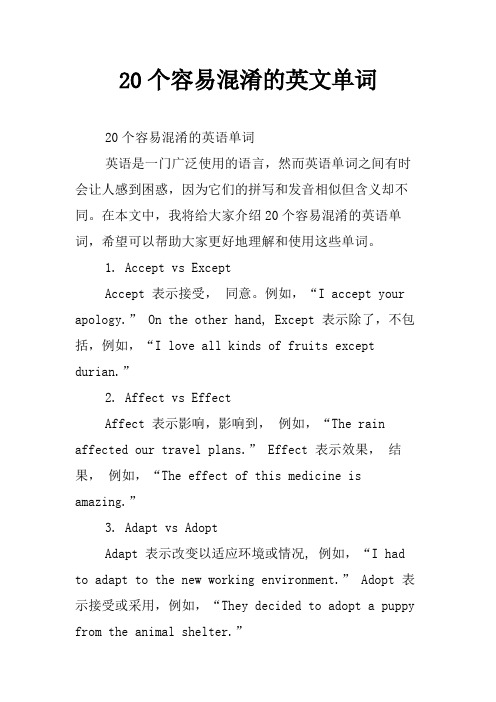
20个容易混淆的英文单词20个容易混淆的英语单词英语是一门广泛使用的语言,然而英语单词之间有时会让人感到困惑,因为它们的拼写和发音相似但含义却不同。
在本文中,我将给大家介绍20个容易混淆的英语单词,希望可以帮助大家更好地理解和使用这些单词。
1. Accept vs ExceptAccept 表示接受,同意。
例如,“I accept your apology.” On the other hand, Except 表示除了,不包括,例如,“I love all kinds of fruits except durian.”2. Affect vs EffectAffect 表示影响,影响到,例如,“The rain affected our travel plans.” Effect 表示效果,结果,例如,“The effect of this medicine is amazing.”3. Adapt vs AdoptAdapt 表示改变以适应环境或情况, 例如,“I had to adapt to the new working environment.” Adopt 表示接受或采用,例如,“They decided to adopt a puppy from the animal shelter.”4. Advice vs AdviseAdvice 是名词, 意思是建议。
例如,“She gave me some good advice about how to prepare for the exam.” Advise 是动词,意思是建议,例如,“I would advise you to take the train instead of driving.”5. Compliment vs ComplementCompliment 表示赞美或恭维某人,例如,“She received many compliments on her new hairstyle.” Complement 表示补充或完善,例如,“The red wine complements the beef dish perfectly.”6. Desert vs DessertDesert 是沙漠的意思,例如,“The Sahara Desert is the largest desert in the world.” Dessert 是甜点或果酱,例如,“I ordered chocolate cake for dessert.”7. Fewer vs LessFewer 是用于可数名词的数量, 指数量更少,例如,“There are fewer people in the library today than yesterday.” Less 是用于不可数名词,表示数量更少,例如,“I need less sugar in my coffee.”8. Imply vs InferImply 是表示暗示或表达某种意思,例如,“She implied that she is not interested in going outwith him.” Infer 是由已知事实推断出结论,例如,“She inferred from his expression that he was not happy.”9. Its vs It’sIts 是形容词性物主代词,意思是属于它的, 例如,“The cat licked its paws.” It's 是缩写,意思是它是,例如,“ It's a beautiful day today.”10. Loose vs LoseLoose 是形容词,表示松的,例如,“These pants are too loose for me.” Lose 是动词, 意思是失去,例如,“I don't want to lose my keys again.”11. Principal vs PrinciplePrincipal 是名词, 表示校长或负责人, 例如,“The new principal of our school is very str ict.” Principle 是名词, 表示基本原则或信念,例如,“I believe in the principle of honesty.”12. Stationary vs StationeryStationery 是文具的意思,例如,“I need to buy some stationery for school.” Stationary 是形容词,表示不动的,例如,“The car was stationary at the traffic light.”13. Than vs ThenThan 是用于比较的介词,例如,“She is taller than her sister.” Then 是表示时间或顺序的副词,例如,“I will finish my homework first, then I will watch TV.”14. Their vs They're vs ThereTheir 是形容词性物主代词,意思是他们的,例如,“Their car is parked in the driveway.” They're 是缩写,意思是他们是,例如,“They'r e going to the beach this weekend.” There 是副词,意思是那里或有,例如,“There is a cat on the roof.”15. To vs TooTo 是介词,在动词后面使用,例如,“I am going to the store.” Too 是副词, 表示过度或也,例如,“It's too hot outside.”16. Weather vs WhetherWeather 是天气的意思, 例如,“The weather is perfect for hiking.” Whether 是连词,是否的意思, 例如,“I'm not sure whether I should take the job or not.”17. Who vs WhomWho 是指代主语, 例如,“Who is that girl over there?” Whom 是指代宾语,例如,“Whom did you give the book to?”18. Your vs You'reYour 是形容词性物主代词,意思是你的,例如,“Your shoes are nice.” You're 是缩写,意思是你是,例如,“You're so kind.”19. Bear vs BareBear 是名词和动词,意思是熊和忍受,例如,“The bear is in the forest.” “I can't bear the pain.” Bare 是形容词,意思是裸露的,例如,“She walked on the beach with bare feet.”20. Farther vs FurtherFarther 表示物理距离上的更远,例如,“I can thro w the ball farther than you can.” Further 表示程度或数量的更多,例如,“We need to do further research on this topic.”总结以上是20个容易混淆的英语单词,它们的意思相似但又有差距,因此在使用时需要特别留意。
初中英语熟词僻义汇总

初中英语熟词僻义汇总以下是一些初中英语中常见的熟词僻义汇总:1. across:除了“穿过”,还可以表示“在对面”,如:The post officeis just across the road.2. almost:除了“几乎”,还可以表示“将近”,如:It's almost 10 o'clock.3. book:除了“书”,还可以表示“预订”,如:I'd like to booka table for two at 7 o'clock.4. cost:除了“花费”,还可以表示“使付出代价”,如:Hiscarelessness cost him his job.5. desert:除了“沙漠”,还可以表示“抛弃”,如:He desertedhis wife and children.6. fine:除了“好的”,还可以表示“罚款”,如:He was fined $100for speeding.7. ground:除了“地面”,还可以表示“理由”,如:He has no groundfor complaint.8. hard:除了“困难的”,还可以表示“努力地”,如:He workshard to support his family.9. hit:除了“打击”,还可以表示“到达”,如:We hit the townat about 10 o'clock.10. leave:除了“离开”,还可以表示“留下”,如:He left his phonenumber on the table.这些只是初中英语中一些常见的熟词僻义,还有很多其他的例子。
在学习英语时,要注意这些多义词的不同用法,以便更好地理解和运用英语。
英语词汇易混淆的个词
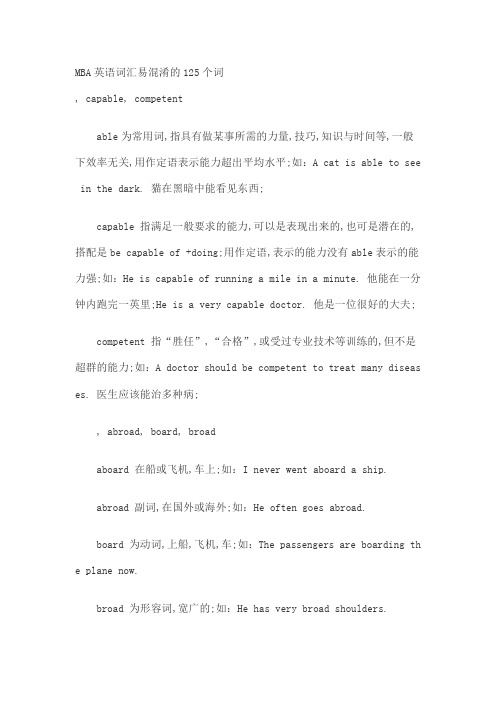
MBA英语词汇易混淆的125个词, capable, competentable为常用词,指具有做某事所需的力量,技巧,知识与时间等,一般下效率无关,用作定语表示能力超出平均水平;如:A cat is able to see in the dark. 猫在黑暗中能看见东西;capable 指满足一般要求的能力,可以是表现出来的,也可是潜在的,搭配是be capable of +doing;用作定语,表示的能力没有able表示的能力强;如:He is capable of running a mile in a minute. 他能在一分钟内跑完一英里;He is a very capable doctor. 他是一位很好的大夫;competent 指“胜任”,“合格”,或受过专业技术等训练的,但不是超群的能力;如:A doctor should be competent to treat many diseas es. 医生应该能治多种病;, abroad, board, broadaboard 在船或飞机,车上;如:I never went aboard a ship.abroad 副词,在国外或海外;如:He often goes abroad.board 为动词,上船,飞机,车;如:The passengers are boarding th e plane now.broad 为形容词,宽广的;如:He has very broad shoulders., receiveaccept 接受,receive“接到”,“收到”;如:I received an invit ation yesterday, but I didn’t accept it. 昨天我收到了一个请柬,但并没有接受邀请;, incident, eventaccident事故;如:a traffic accident 交通事故incident“附带事件”,在政治上特指引起国际争端或战争的事件,事变;event “事件”,指特别重要的事件,通常是由以前的努力而产生的结果,也指国家和社会的事件;5. accomplish, complete, finish, achieve, attainaccomplish表成功,强调完成的结果而不是过程;如:Because of hi s hard word, things are accomplished. 由于他的努力,事情都已完成了;complete 表示积极的完成,更具体地指建筑、工程等的完成;如:Has he complete his novel yet 他的小说写完了吗finish 最常用,后接动词的-ing形式,表示在一个活动的连续过程中完成了最后的一步或阶段;如:I’ll finish the job alone. 我要独自完成这项工作;achieve 完成,实现,强调通过努力而达到目的;如:You will achiev e success if you work hard.Attain达到,实现,常用于一般人的能力不易达到的目的;如:Greate r efforts are needed before we can attain our goals., correct, exact, preciseaccurate准确的,精确的;如:Clocks in railway stations should be accurate.火车站的钟应该是准确的;correct“正确的”,指符合一定的标准或准则,含有“无错误的”意味;它的反义词是incorrect, wrong.exact“精确的”,“恰好的”,比“大体上正确”更进一步,表“丝毫不差”;它的反义词是inexact;precise强调“精确”,“精密”;, charge, sueaccuse 指责,指控,常与of 搭配;如:His boss accused him of ca relessness.charge 常与with搭配;如:The police charged the driver with reckless driving.sue 常与for 搭配;如:Smith sued his neighbor for damaging h is house., acquire, require, inquireachieve成功地完成,实现;如:He will never achieve anything u nless he works harder. 如他不努力工作,将会一事无成;acquire取得,获得,学到;如:acquire knowledge 获得知识inquire打听,询问;如:inquire a person’s name问一个人的姓名require需要;如:We require more help. 我们需要更多的帮助;, action, deedact 用作名词时,与action, deed均可表“行为”,“举动”;Act指时间较短的个人行动或行为,强调结果;如:The farmer caught the boys in the act of stealing his apples. 农夫在孩子们正偷他的苹果时把他们抓住了;action较正式,往往指不止包含一个步骤,且持续时间较长的行为或行动,强调行为的过程;如:Actions are more important than words. 行动比语言更重要;deed为正式用语,多指伟大的,显着的,感人的行为;如:They thanke d him for his good deeds. 他们感谢他做的好事;, true, real, genuineactual 意为“实际的”,“现实的”,指所形容的事物在事实上已经发生或存在,而不是仅在理论上可能发生或存在的;true“真实的”,指与实际相符,而非虚假;genuine “真的”,“非冒充的”,“货真价实的”,强调正宗而非冒牌;, enough, sufficientadequate 足够的,指数量多,适合需要的数量;enough足够的,指数量多,足够满足某种目的或愿望;sufficient同enough,常可互换使用;但sufficient指数量多,足够满足某种需要,在口语中常用enough,在书面语中常用sufficient,在不易肯定时多用enough;Enough可放在被修饰名词后,且可作副词,sufficient 则不可这么用;, confess两者都表“承认”;admit指大胆地承认以前试图不论或推诿的坏事;如:John has admi tted to breaking the window. 约翰已承认打破了窗玻璃;Confess常指承认错误,罪行等;如:The thief confessed his crim e to the police. 小偷向警察承认了罪行;,adviseadvice劝告名词;如:I want to give you some advice.advise劝告动词;如:What do you advise me to do, adaptadopt 1收养;如:Since they have no children of their own, t hey decided to adopt a little girl. 他们自己没有孩子,所以决定收养一个小女孩;2采纳,采用,通过;如:He adopted our suggestion.他采纳了我们的建议;adopt与adapt词形相近,后者的意思是“使适合”,“改编”等;, proceed, progress均可表“前进”;advance表向一个特定的目的地,在一定的时间或空间内稳定地向前运动;如:Napoleon’s army advanced on Moscow. 拿破仑的军队向莫斯科挺进;proceed强调从一处向另一处的运动,常表停顿后继续前进;如:They proceeded from London to Paris. 他们从伦敦往巴黎前进;peogress 多表自然过程,指生长,发展等稳定地或循环往复地前进;如:The year is progressing, it will soon be summer. 光阴似箭,很快又是夏天了;, benefit, profitadvantage 常指一种使某人处于比其他人相对有利的地位,机会或时机;如:He had the advantage of good education. 受过良好的教育对他十分有利;profit 多指报偿或报偿性的收入;如Did you make any profit las t year 你去年赚钱了吗benefit 指物质利益或精神方面的好处;如:I get no personal ben efit from the business.我个人从这家企业中并不获益;, convince, persuade均可表“劝说”;advise表建议,规劝某人应该做某事或如何做;如:He advised me t o put my money in the bank. 他劝我把钱存入银行;convince指向某人陈述事实,运用推理或逻辑证明使某人信服;如:W e convinced Smith to go by train rather than plane. 我们说服了史密斯乘火车而不乘飞机前往;persuade指用感情说服某人去做某事;如:I persuaded him to go back to work. 我说服他回去工作了;, effectaffect影响动词;如Smoking affects health.effect效果,影响名词;如:Government policy will not have any effect on us., provide, supply都有“提供,供给”的意思;afford一般只用于抽象事物;provide 和supply意思相同,两个词都和with连用,构成provide / supply somebody with something的结构;, consentagree 为常用词;如:Do you agree to the condition 你同意这个条件吗consent为正式用词,多用于上下级的关系,表示同意别人的要求或请求;如:Did the king consent to your plan国王同意你的计划吗, help, assist用作动词均可表“帮助”;aid为正式用词,help最常用;assist最正式,表示协助某人做某事,尤指在体力上或具体事务上帮助和扶持;如:She employed a woman to assist her with the housewo rk. 她雇了一名妇女帮她做家务;, living, livealive 指虽有死的可能,但仍活着,一般只作表语;living可用于人或物,作定语时可前可后;live只做前置定语,用于动物和个别事物前;, nearly一般说来,almost比nearly 表示的意思更接近“开始”、“完成” 目标等;在all, every, always 前,两者都可用;如:He is almost nearly smoking. 他几乎每天抽烟;almost可同never, no, nobody, none, nothing 连用,而nearly却不能;如:Almost no one believed her. 几乎没人相信他;, lonelyalone只表“独自”的客观状态,没有感情色彩,只作表语;lonely表“孤独”,:“寂寞”,能作定语和表语;如:When she is left alone, s he feels lonely. 剩下她一人时她就感到寂寞;alone, only均可表“只有”,但alone须置于被修饰词之后,only往往置于被修饰词前;如:He alone Only he can remember the story. 只有他才能记起这段经历;, all readyalready已经副词;如:The plane had already landed before we got to the airport.all ready准备好的作表语;如:We were all ready to leave when the telephone rang., change作不及物动词时,两者可通用;作及物动词时,alter是对局部,表面的改变,而change则是对本质的,全面的,彻底的改变;如:Can you alter the dress 你会改做这件衣服吗Can you change the dress你能给我更换这件衣服吗, all togetheraltogether总计,总共;如:Altogether there are six of us. 我们总计六人;all together 全都在一起;如:We played the game all together.我们大家都一起来玩游戏吧;, astonish, surprise都可作及物动词,意思相近,一般都是以事物作主语,人称作宾语;amaze强调“使惊讶”,有时还有“惊叹”,“佩服”等意;astonish表示“使大吃一惊”,“几乎使人无法相信”之意;surprise只表“出乎意料之外”;, betweenamong 在……中间三者或三者以上之间;如:Our house is hidden a mong trees.between在两者之间;如:It is easy to distinguish between a J apanese and a Chinese., declareannounce指宣布公众期望或与公众有关的事情,含有预告的意味;如:The government announced that they would pay their debts. 政府宣布将偿还债务;declare指正式负责地宣布,声明,通常用于庄重的场合;如:The jud ge declared him guilty.法官宣布他有罪;, bother, trouble, disturbannoy指外界的干扰令人讨厌或无法忍受,或指某人故意去妨碍别人;bother打扰,麻烦,指给人行动带来不便或身心上带来痛苦;如:May I trouble you with a few questionsdisturb打扰,扰乱,指使正常秩序或一时的安定受到破坏,精力一时不能集中;如:I am sorry to disturb you., reply, respond用作动词,都可表“回答”,“答复”;answer是常用词,后可接letter回信,question回答问题,doorbell 开门,telephone接电话,advertisement应征广告等;reply较正式,一般只作不及物动词,可与to连用;如:He has repli ed to my letter.他回答了我信中提的问题;respond作“回答”解,用得较少,也同to 搭配;如:He quickly res ponded to the question. 他很快就回答了问题;另外,respond还可表“对……反应”,“响应”;33. appreciate, enjoyappreciate指对事物有深刻的理解能力并能鉴赏;enjoy是一般用语,仅指感官或智力上的满足,“享受”的意味较强;34. approve, proveapprove1赞成,同意;如:I don’t approve of wasting time.我不赞成浪费时间;2批准,通过;如:The minister approved the building plan. 部长批准了建筑计划;prove和approve词形相似,prove是“证明”,“表明是”等;35. argue, debate, disputeargue着重“说理”,“论证”,“企图说明”,且后可接that引导的从句;debate着重双方各自陈述理由,尤其是“公开地”、“正式地”辩论;如:The subject was hotly debated.dispute着重就分歧进行热烈的“争论”,含有“相持不下”或“未得到解决”的意味;如:He disputed with his wife on household expens es.36. arise, rise, raisearise表无形的东西如困难,问题等“出现”,“发生”;rise指具体事物的“上升”,“升起”,也是不及物动词;如:The su n rises in the east.太阳从东边升起;raise为及物动词,“使……上升”,“举起”等;如:He raised his hand.他举了手;37. assure, ensure, insureassure以十分肯定的语气向别人保证某事一定会发生,后需连用人称代词或指人的名词作宾语;ensure表普通的“保证”;insure表“保险”,有时同ensure可以换用;38. awake, wake, waken都可作动词;awake既可及物,也可不及物,多用于比喻;wake常指“睡醒”,多为不及物动词;waken多用作及物动词,常指“吵醒”,“惊醒”;39. await, waitawait是及物动词;如:I await your further instructions.wait“等”、“等候”,是不及物动词,后常接介词for;如:I will wait for you at the school gate.40. award, prize, rewardaward, reward作动词;award意为“授予奖品,奖金等”,后面可跟双宾语;reward意为“报酬”,“酬谢”,只能跟人或以人的行为作宾语;award, prize, reward作名词时,award常指奖金,奖品;prize多指在竞赛、竞争中获胜所赢得的奖;reward则指为某项劳动或行为所付的酬金;41. base, basisbase表事物的下部的底部,多用于具体事物;basis多用于比喻,主要指命题的基础;如:His ideas have no basi s in reality.他的意见缺乏现实基础;42. beat, winbeat表在比赛和战斗中打败对手,后接对手作宾语;Win作及物动词时,其宾语为游戏、比赛、战斗、奖金等名词;如:He has won the race.他赢得了赛跑的胜利;43. beneath, below, underbeneath表示同表面接触,与on 相对;Below表示“在下面,低于”,与above相对;under表示“在……正下方”与over相对;44. beside, besidesbeside在……旁边;如:Come and sit beside me.besides除……之外;如:I have two other umbrellas besides th is one.45. big, great, largebig强调体积,质量,容量和重量大;如:a big box;Big也有抽象意义,指重大的事件或行为;如:a big mistakegreat带感情色彩,多指程度和质量,指具体事物或人时,表“突出”,“引人注目”;如:a great manlarge多指面积,数目或数量大;如:a large population, a large number等;46. bloom, blossombloom多指供观赏植物的开花;如:The roses are blooming.blossom多指果树等植物的开花;如:The apple trees are blossom ing.47. borrow, lendborrow借入;如:Can I borrow your pen for a momentlend把……借给;如:Can you lend me your bike48. bring, takebring带来;如:Bring me some water, please.take拿走;如:Shall I take some flowers when I go and see he r49. calculate, compute, estimatecalculate通常指用数学方法进行比较复杂,难度较大的精确计算;如:You can’t expect a schoolboy to calculate distances in astr onomy.compute常指比较简单的运算;如:It was computed that two thir ds of the students in the class passed the examination.estimate估计,常指对数量、成本等事先进行判断或估计;如:Some farmers asked the weatherman to estimate next year’s rainfall.50. cheat, deceive, trickcheat欺骗,常用词,主要指为了自己的利益欺骗人;deceive表示隐瞒真相或以假相骗人;如:The boy deceived the te acher by lying.trick哄骗,表示耍手段进行欺骗,强调在行骗时使用计策,有时也指并非出于恶意的欺骗;如:Tom cleverly tricked his mother into appr oval.51. childish, childlikechildish幼稚的;如:It was very childish of him to lose his temper over something so unimportant.childlike孩子般天真的;如:When she won the gold medal, there was childlike smile on her face.52. choose, pick, select, electchoose是一常用词,表一般的“选择”;pick通常用于不需要认真权衡,对比就能做出决定;select侧重“在同类的许多东西中,进行有斟酌的精选”;elect指选举或用其他方法推选人;53. cloth, clothingcloth布;如:I need three yards of cloth to make a suit.clothing衣服总称;如:You’d better give all the old clothing away.54. complex, complicated均可表“复杂”;complex为常用词;complicated为正式用词,表由于组成部分太多,相互关系太复杂而不能理解,语气很强;55. compose, consist, constitutecompose为常用词,常用被动语态,如用主动语态,主语应用复数形式;如:Twelve men compose a jury.十二人组成陪审团;consist表一个整体由几个部分组成只能用主动语态;如:The Unite d Kingdom consists of Great Britain and Northern Island.联合王国是由大不列颠及北爱尔兰组成;constitute为正式用词,与consist相反,表由哪些部分构成整体;如:Twelve months constitute a year.一年有十二个月;56. considerable, considerateconsiderable相当多的,可观的;如:He met a considerable amoun t of trouble.他遇到了许多麻烦;considerate 考虑周到的,体谅的;如:It was considerate of you not to trouble us.你真体贴人,不打扰我们;57. consistent, constant, continual, continuousconsistent一致的,符合的;如:His action is always consistent with his words.constant不断的,表示持续和惯常的重现,往往没有变化;如:He att ributes his health to his constant exercise.continual频频的,不停的,时断时续,中间可有间歇;如:Continual smoking is bad for health.continuous不断延伸的,连续不断的,强调中间无间断;如:Everythi ng in the universe undergoes continuous development and change.58. crack, crashcrack使破裂,砸开;如:I can crack it, but I can’t break it. 我能把它弄裂,但不能把它弄破;crash摔坏,坠毁;如:The plane crashed shortly after the take -off.飞机起飞不久就坠毁了;59. crawl, creepcrawl多指蛇,虫类等身体沿地面或其他表面的动作;如:There is a n insect crawling up your back. 有一虫子正在你的背上往上爬;creep多指哺乳动物或人等用四肢爬行的动物偷偷摸摸无声缓慢的前行动作;如:They arrived late and crept into the classroom.我们迟到了,便悄悄地溜进教室;60. cure, treatcure治愈,医治;如:The medicine will cure of your disease.这药能治好你的病;cure表示治好,treat只表示“给……治病”;61. current, present均可表“现在”,“目前”;current强调在现阶段正在流行,通用,但不一定是最新的;如:curre nt English 当代英语present为常用词,指现在正在通用的,在时间上比current的范围更窄;如:What’s your present address你现住址是哪里62. custom, habit均可表习惯;custom为正式用词,多指社团或人们的习惯行为方式;habit为常用词,多指个人因多次重复而形成做某事的趋势或意愿;如:He has the bad habit of biting his nails.他有咬手指的坏习惯;63. damage, destroy, harm, ruin均可表“破坏”,“损坏”;damage一般指部分性的破坏,含可修复使用;destroy指十分彻底的毁坏,破坏;如:The whole city was destroy ed in the earthquake.地震中整个城市被毁了;harm多指带来悲痛,产生恶果的伤害,可以是肉体的也可是精神的;如:Doctors say smoking harms our health.医生说吸烟对身体有害;ruin为正式用词,强调由于自然力或时间的作用而逐渐损坏,用于比喻时也指彻底毁坏名声,期望等;如:She poured water all over my pai nting and ruined it. 她把水倒在画上,把它毁了;另外,ruin的复数形式ruins表“废墟”;64. decrease, reducedecrease多表示逐渐缩小;如:The swelling decreased daily.肿胀日渐消退;reduce为常用词,使用范围较大,可指尺寸,数量,规模和程度等,也可指地位,经济状况;如:He won’t reduce the rent of the house.他不愿降低房租;65. dependent, independentdependent依赖的,依靠的on, upon;如:Success is dependent on your hard work.Independent 不依靠的,独立的of;如:John was independent of h is parents when he was still a child.66. desert, dessertdesert沙漠;如:Have you ever been to a desertDessert甜食;如:What would you like for dessert, an apple p ie or ice-cream67. discover, inventdiscover发现;如:A coal mine has been discovered in that ar ea.invent发明,创造;如:A kind of toothbrush has been invented to relieve toothache.68. duty, responsibility均有“责任”之意,可换用;duty意义较广,多指发自内心的道德伦理上的责任感;responsibility着重指从道义或法律上对事件之后果负责;如:I to ok full responsibility for breaking the vase.我承担打破花瓶的全部责任;69. effective, efficient均可表示“有效的”;effective常用以指物,强调能产生某种预期的效果;如:effective medicine, effective method等;efficient“效率高的”,“有能力的”,用以指人或物,着重有效地利用时间、精力并取得预期效果;如:The German telephone system is hi ghly efficient. 德国的电话系统效率很高;70. economic, economicaleconomic经济学的;如:the economic doctrines of Ricardo李嘉图的经济学说economical节约的,节俭的;如:He is economical of money and t ime.71. electric, electrical, electronic三词都与电有关electric着重于发电的,电动的或导电的;如:electric generator 发电机;electric light电灯electrical多指本身不产生电,但是与电有关的;如:electrical en gineering电机工程;an electrical transcription广播唱片electronic 电子的,电子操作的;如:electronic engineering电子工程学72. emergence, emergencyemergence是emerge的名词形式;Emergency意为“紧急情况”,“突然事件”;73. everyday, every dayeveryday每日的,日常的作定语;如:This morning exercise has b ecome my everyday routine.every day每天作状语;如:She gets up early every day.74. endure, bear, stand, tolerate, withstand都表忍受,忍耐;bear忍受,容忍,指忍受使人悲痛、烦恼或痛苦的事情;如:It is ha rd to bear to be laughed at.被人取笑是难以忍受的;endure忍耐,书面语,指长时间经受痛苦而不屈服;如:It takes pat ience to endure hardships. 忍受苦难需要耐力;stand忍受,与bear同义,但较口语化;如:She can’t stand havin g nothing to do.没事干,她受不了;tolerate容忍,容许,指自我克制的态度,对于令人反感的事没有任何抗议;如:I can’t tolerate him if he goes on like that. 他如果继续这样下去的话,我决不会容忍他;withstand经受,承受,指顶住外来的压力和攻势;如:They have wit hstood all test.他们经受了一切考验;75. error, mistake, fault, shortcoming均表“缺点”,“错误”;error是通用词,指任何错误,“犯错误”可以说commit /make an er ror;mistake指判断或理解方面,或指因考虑不周而造成的错误,搭配是ma ke a mistake;fault表示“过失”,可与error通用,现多用来指缺点,特指缺乏某要素因而不完美;如:There is a fault in this machine.这台机器有一处毛病;构成短语 find fault with挑剔,找毛病;shortcoming 缺点,可指人或事物的本质上不足之处常用复数;如:In spite of his shortcomings, I still like him.尽管他缺点多,我仍然喜欢他;76. especially, particularly, specially均可表“特别地”;especially一般表示某事物在意义、程度、重要性性超过其他事物;如:I love Italy, especially in summer.我喜欢意大利,尤其在夏天;particularly往往着重说明与同类事物不同的个别事物;如:The vi sitors admired his paintings, but particularly the portrait of his daughter.来访者赞赏他所有的绘画,特别是他女儿的画像;specially 多表示“专门地”,“为特别目的的地”,如表“不寻常”,“过分”等,可与especially通用;如:I made chocolate cake special ly for you.我特地为你做了巧克力蛋糕;77. exchange, replace, substitute均含有“换”之意;exchange指“互相交换”;replace的含义为“替换”,“取代”;如:George has replaced Ed ward as captain of the team.乔石治已接替爱德华担任队长;substitute则表示“用……代替”;如:We substitute nylon for cotton.我们用尼龙代替了棉花;78. fall, descend都可表向下运动;fall指由于重力突然从高处落下或因为失去平衡而跌倒;如:She sl ipped and fell down.她滑了一下摔倒了;descend多指沿着斜面而缓慢向下移动;如:He descended the hill.他下山了;79. fame, honor, reputation都可表名声;fame是常用词,一般指好的名声;如:He was not anxious for fame.他并不渴望成名;honor荣誉,尊敬,指受到公众崇敬的荣誉和光荣;如:This is an ho nor more than I can deserve.这光荣我受之有愧;reputation名誉,指公众对某人的看法,可好可坏;如:He has a rep utation for laziness.他的懒惰出了名;80. fell, fallfell砍伐树木;如:They are felling the trees.他们在砍树;fell也可作fall的过去式;fell作“砍伐”时,它的过去式,过去分词分别为felled, felled.81. formally, formerlyformally正式地;如:We were required to dress formally for t he party.formerly从前;如:Formerly he worked in a factory, but now he is a teacher.82. frank, honest, sincere都与坦率有关;frank直率的,坦白的,着重表达自己的情感和想法时没有保留;如:T o be frank with you, I do not know the answer myself.老实说,我自己也不知道答案;honest诚实的,正直的,指遵守正直等道德准则;如:We want your h onest opinion, not empty compliments.我们需要你的诚心恳的意见,而不是空洞的恭维;Sincere诚挚的,诚恳的,强调出自内心的真心实意;如:Please acce pt this as a token of my sincere gratitude.请接受这份表示我真诚感谢的礼物;83. gaze, stare, glance, glimpse都与“看”有关;gaze“凝视”,强调由于惊奇、兴趣,目不转睛地注视;Stare强调由于好奇、害怕或无意地睁大眼睛盯着看看;glare“怒视”,是凶狠地含有威胁地盯着看;glimpse“一瞥”,是短暂而急促地看,含有意地匆匆地看一眼,现多用作名词;注意一般表示“看”的单词大多同at搭配构成短,但glimpse却有c atch have a glimpse of这一搭配;84. genius, gift, talent都有天才之意;genius天才,是这三词中程度最高的词;如:Shakespeare was a man of great genius.gift天赋,比“天才”的意义要弱一点,可用复数;如:He is a man of many gifts.他多才多艺;talent才能,一般不用复数,指通过学习和勤奋掌握的本领、技术和其他的活动能力;如:As a novelist, he shows great talent in charact erization.作为小说家,他在描写人物方面显出很大的才能;85. get, achieve, acquire, attain, gain, obtain均可表“获得”;get用得最广,可指以各种方式获得各种东西;如:Where can I get enough information我从哪儿能得到足够的资料achieve多指克服困难后取得胜利,成功,强调“得到”这一结果;如:He achieved his ambition in the end.他最终实现了他的抱负;acquire指通过本身的努力逐渐获得知识、能力和荣誉等;如:acqui re knowledge获得知识;attain为正式用词,多用于庄重场合,主要指通过努力达到重要目的或得到珍贵的东西;如:The scientist attained great fame by a new discovery.那科学家由于一次新发现而出了名;gain多指付出极大努力后获得或赢得给自己带来优势的东西;如:Th ey gained the victory after a bloody battle.浴血奋战后他们赢得了胜利;obtain多指凭努力或恳求得到急需或很想得到的东西;如:Howard h ad failed to obtain a scholarship.霍华德没能得到奖学金;86. grasp, seize, snatch都有“抓”的意思;grasp为常用词,是用适度的力量抓牢;seize是突然用力抓住;snatch“攫取”,指出其不意地,突然一把抓住并拿向自己;87. hanged, hunghang, hanged, hanged吊死;如:He hanged himself when he fail ed.Hang, hung, hung悬挂;如:His pictures were hung in the muse um.88. haste, hurry, speed都与速度有关;haste急速,急忙,多指人的动作迅速和匆忙;如:I felt no haste t o depart.我不急着走;hurry急忙,匆忙,常表示混乱,焦急和忙乱的意思;如:I forgot to pay my bill in my hurry.Speed迅速,快,不暗示忙乱或焦急;如:More haste, less speed.欲速则不达;89. hard, hardlyhard努力地;如:Take it easy. You’ve been working too hard.hardly几乎不,简直不;如:The children can hardly wait to hea r the news.90. home, househome家;如:East or west, home is best.House房子,住宅;如:Our new house is quite near the station.91. equal, equivalent, identical, same皆含相同,相等之意;equal相同的,相等的,特指“数量,价值等”相同;如:Their ages a re equal.equivalent相等的,特指“价值,效力,意义”等相同的;如:This se ntence is equivalent to that.identical相同的,相等的,侧重于某一细节上完全相同;如:She wor e the identical dress on both occasions.identical相同的,相等的,侧重于某一细节上完全相同;如:She wor e the identical dress on both occasion.她在两种场合穿同样的衣服;same相同的,表示在质量、类型、外表或意义上相同,而实际上有差异;如:He is of about the same age as you.92. imaginable, imaginary, imaginative都是与想象有关的形容词;imaginable可以想象得到的;如:This is the only solution imag inable.这是惟一想得出的解决办法;imaginary假想的,虚构的;如:an imaginary character in a stor y故事里的虚构人物imaginative富于想象力力的;如:an imaginative artist想像力丰定的艺术家93. indifferent, differentindifferent冷漠的,不关心的,同to搭配;如:He was indifferent to his personal appearance.他从前不注意自己的外表;different跟……不一样,同from搭配;如:This book is differen t from that one.这本书跟那本不一样;94. industrial, industriousindustrial工业的,产业的;如:Italy is becoming an industrial nation.意大利逐步成为工业国;industrious勤劳的,勤奋的;如:He is an industrious student.他是个用功的学生;95. influence, effect都有“影响”之意;influence可作动词、名词,指对某人的思想行为、性格等产生影响;如:She was influenced by her middle school teachers.她受中学时的老师影响;effect用作动词意为“造成”,“产生”,用作名词强调由于影响而产生特殊效果;如:The effects of the medicine are very good.药效很好;96. intention, idea, purposeintention主要指个人心里产生的做某事欲望或得到某物的想法,常见的搭配是have the intention of doing something.Idea指“意见”,“见解”;Purpose意为“目的”,着重于实现目的的决心和待付出的努力;如:F or what purpose do you learn English你学英文的目的是什么97. last, latest, final, ultimatelast最后的,与first相对,还可指“上一次的”;如:My seat is i n the last row.latest最近的,指时间上;如:the latest news最新消息。
易混淆丨20组常见的易混淆的英语单词,不要再弄错啦!
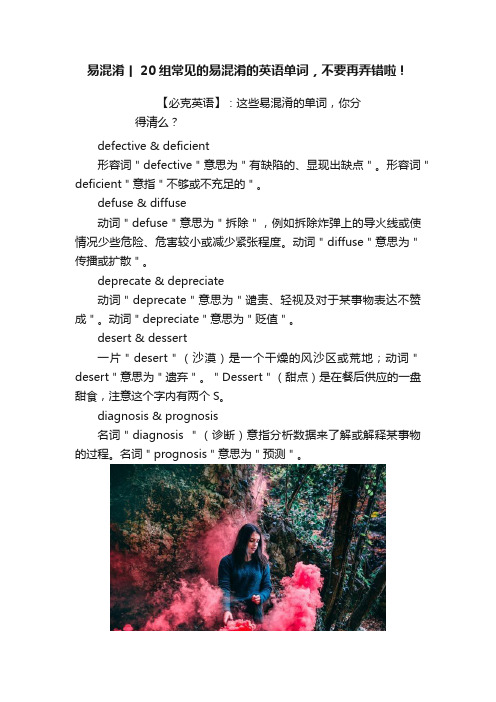
易混淆丨20组常见的易混淆的英语单词,不要再弄错啦!【必克英语】:这些易混淆的单词,你分得清么?defective & deficient形容词"defective"意思为"有缺陷的、显现出缺点"。
形容词"deficient"意指"不够或不充足的"。
defuse & diffuse动词"defuse"意思为"拆除",例如拆除炸弹上的导火线或使情况少些危险、危害较小或减少紧张程度。
动词"diffuse"意思为"传播或扩散"。
deprecate & depreciate动词"deprecate"意思为"谴责、轻视及对于某事物表达不赞成"。
动词"depreciate"意思为"贬值"。
desert & dessert一片"desert"(沙漠)是一个干燥的风沙区或荒地;动词"desert"意思为"遗弃"。
"Dessert"(甜点)是在餐后供应的一盘甜食,注意这个字内有两个S。
diagnosis & prognosis名词"diagnosis "(诊断)意指分析数据来了解或解释某事物的过程。
名词"prognosis"意思为"预测"。
discreet & discrete形容词"discreet"意为"谨慎地自我克制"。
"Discrete"意指"截然不同的"或"分离的"。
请特别注意这两个字的拼法。
disinterested & uninterested形容词"disinterested"意思为"公正无私与不带偏见的"。
"Uninterested"意指漠不关心或满不在乎的。
dual & duel形容词"dual"意指两个或双重;"duel"可当名词或动词使用,指的是一场决斗或斗争。
elicit& illicit动词“elicit”意指“唤起”或“显示出”;形容词“illicit”的意思为“非法的”或“不允许的”。
eminent& imminent形容词“eminent”意思为“显眼的”或“杰出的”。
易混淆英语词汇

易混淆英语词汇一、accept([əkˈsept],动词)和except([ɪkˈsept],介词/连词)1. accept.- 意思:接受;认可。
例如:I accept your invitation.(我接受你的邀请。
)2. except.- 意思:除……之外。
例如:Everyone went to the party except Tom.(除了汤姆,每个人都去参加聚会了。
)二、affect([əˈfekt],动词)和effect([ɪˈfekt],名词;[ɪˈfekt],动词)1. affect.- 意思:影响;使感动。
例如:The bad weather affected our trip.(恶劣的天气影响了我们的旅行。
)2. effect(名词)- 意思:影响;效果。
例如:The medicine has a good effect on my illness.(这种药对我的病有很好的效果。
)- effect(动词)- 意思:使发生;实现。
例如:The new policy will effect great changes in our company.(新政策将使我们公司发生巨大的变化。
)三、advice([ədˈvaɪs],名词)和advise([ədˈvaɪz],动词)1. advice.- 意思:建议;劝告(是不可数名词)。
例如:Can you give me some advice?(你能给我一些建议吗?)2. advise.- 意思:建议;劝告。
例如:I advise you to study hard.(我建议你努力学习。
)四、beside([bɪˈsaɪd],介词)和besides([bɪˈsaɪdz],介词/副词)1. beside.- 意思:在……旁边。
例如:He sat beside me.(他坐在我旁边。
)2. besides(介词)- 意思:除……之外(还有)。
常见英语单词熟词僻义
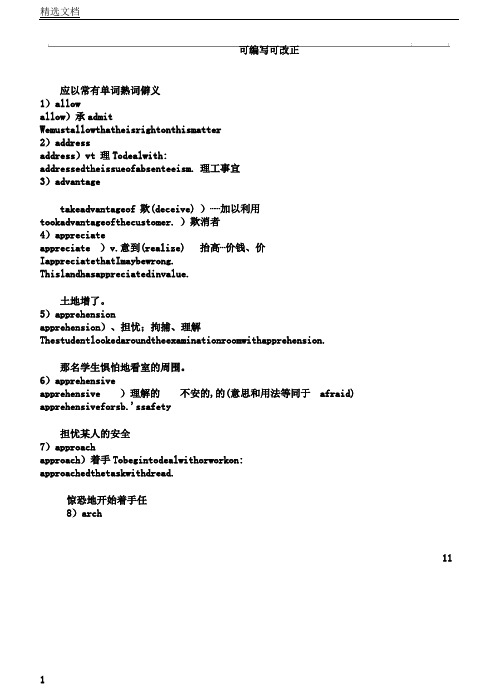
可编写可改正应以常有单词熟词僻义1)allowallow)承admitWemustallowthatheisrightonthismatter2)addressaddress)vt 理Todealwith:addressedtheissueofabsenteeism. 理工事宜3)advantagetakeadvantageof 欺(deceive) )⋯⋯加以利用tookadvantageofthecustomer. )欺消者4)appreciateappreciate )v.意到(realize) 抬高⋯价钱、价IappreciatethatImaybewrong.Thislandhasappreciatedinvalue.土地增了。
5)apprehensionapprehension)、担忧;拘捕、理解Thestudentlookedaroundtheexaminationroomwithapprehension.那名学生惧怕地看室的周围。
6)apprehensiveapprehensive )理解的不安的,的(意思和用法等同于afraid) apprehensiveforsb.'ssafety担忧某人的安全7)approachapproach)着手Tobegintodealwithorworkon:approachedthetaskwithdread.惊恐地开始着手任8)arch11archadj 皮的,皮的n.弓形anarchsmile )皮的浅笑Hetappedthesideofhisnoseinanuncharacteristicallyarchgesture.9)argumentargument 点,据10)asnotsomuch...as" 表示"与其是⋯⋯倒不如 "。
否认前者必定后者Heisnotsomuchawriterasareporter.Sciencemovesforward,theysay,notsomuchthroughtheinsightsofgreatmenofgeniusasbecauseofmoreordinarythingslikeimprovedtechniquesandtool. )It'snotsomuchahobbyasacareer(=morelikeacareerthanahobby).11)assumeassume肩负,假装,假设,想,assume)anobligation 肩负12)balancebalancesheet 表13)balancebalance 余Somethingthatisleftover;aremainder.余:剩下的某物;余数14)bottlebottleup 装入瓶中控制(克制)Toholdin;restrain:bottledupmyemotions.15)catercater 食品,迎合(caterfor)catering 公共食)cateringindustry 公共食Mostofourworknowinvolvescateringforweddings.可编写可改正(摘自真2216)checkcheck控制阻挡Theconditionofbeingstoppedorheldback;restraint: keptmytemperincheck;holdingagriculturalpestsincheckwithsprays.控制我的性情;用喷雾剂灭农业害虫17)chestchest 箱子trunk 箱子、象鼻子18)claimclaim 索赔Thesumofmoneydemanded. )赔款:要求获取的金额Youcanmakeaclaimonyourinsurancepolicy.19)compoundcompound)n.集中营、围栏分开或保围的建筑物或建筑群、化合物21)compromisecompromise危害妥协Aconcessiontosomethingdetrimentalorpejorative:危害:关于一些有害或恶劣状况的退步:Suchconductwillcompromiseyourreputation.这样行为将会伤害你的声誉。
信不信,这里90%以上的单词你可能不会读!
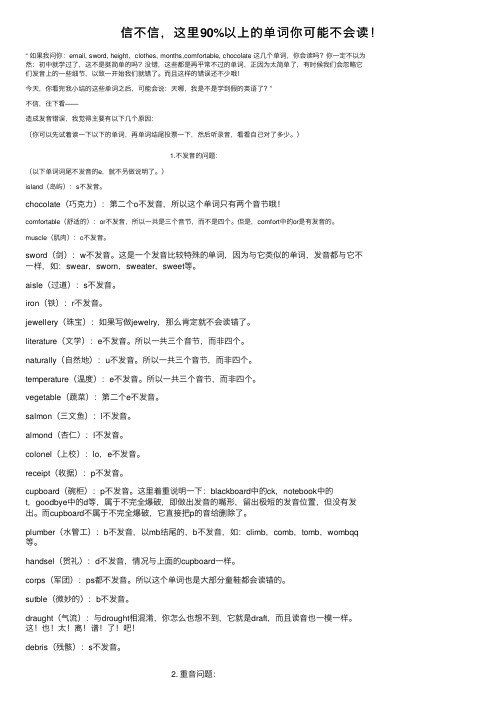
信不信,这⾥90%以上的单词你可能不会读!“ 如果我问你:email, sword, height,clothes, months,comfortable, chocolate 这⼏个单词,你会读吗?你⼀定不以为然:初中就学过了,这不是挺简单的吗?没错,这些都是再平常不过的单词,正因为太简单了,有时候我们会忽略它们发⾳上的⼀些细节,以致⼀开始我们就错了。
⽽且这样的错误还不少哦!今天,你看完我⼩结的这些单词之后,可能会说:天哪,我是不是学到假的英语了?”不信,往下看——造成发⾳错误,我觉得主要有以下⼏个原因:(你可以先试着读⼀下以下的单词,再单词结尾投票⼀下,然后听录⾳,看看⾃⼰对了多少。
)1.不发⾳的问题:(以下单词词尾不发⾳的e,就不另做说明了。
)island(岛屿):s不发⾳。
chocolate(巧克⼒):第⼆个o不发⾳,所以这个单词只有两个⾳节哦!comfortable(舒适的):or不发⾳,所以⼀共是三个⾳节,⽽不是四个。
但是,comfort中的or是有发⾳的。
muscle(肌⾁):c不发⾳。
sword(剑):w不发⾳。
这是⼀个发⾳⽐较特殊的单词,因为与它类似的单词,发⾳都与它不⼀样,如:swear,sworn,sweater,sweet等。
aisle(过道):s不发⾳。
iron(铁):r不发⾳。
jewellery(珠宝):如果写做jewelry,那么肯定就不会读错了。
literature(⽂学):e不发⾳。
所以⼀共三个⾳节,⽽⾮四个。
naturally(⾃然地):u不发⾳。
所以⼀共三个⾳节,⽽⾮四个。
temperature(温度):e不发⾳。
所以⼀共三个⾳节,⽽⾮四个。
vegetable(蔬菜):第⼆个e不发⾳。
salmon(三⽂鱼):l不发⾳。
almond(杏仁):l不发⾳。
colonel(上校):lo,e不发⾳。
receipt(收据):p不发⾳。
cupboard(碗柜):p不发⾳。
- 1、下载文档前请自行甄别文档内容的完整性,平台不提供额外的编辑、内容补充、找答案等附加服务。
- 2、"仅部分预览"的文档,不可在线预览部分如存在完整性等问题,可反馈申请退款(可完整预览的文档不适用该条件!)。
- 3、如文档侵犯您的权益,请联系客服反馈,我们会尽快为您处理(人工客服工作时间:9:00-18:30)。
新概念学单词:容易误解的英语词汇
1. 日常用语类
lover 情人(不是"爱人")
busboy 餐馆勤杂工(不是"公汽售票员")
busybody 爱管闲事的人(不是" 大忙人")
dry goods (美)纺织品;(英)谷物(不是"干货")
heartman 做心脏移植手术的人(不是"有心人") mad doctor 精神病科医生(不是"发疯的医生") eleventh hour 最后时刻(不是"十一点") sweet water 淡水(不是"糖水")confidence man 骗子(不是" 信得过的人") criminal lawyer 刑事律师(不是"犯罪的律师") blind date (由第三者安排的)男女初次会面(并非"盲目约会"或瞎约会")
dead president 美钞(上印有总统头像)(并非" 死了的总
统") personal remark 人身攻击(不是"个人评论") service station 加油站
rest room 厕所(不是"休息室")
horse sense 常识(不是"马的感觉")
capital idea 好主意(不是" 资本主义思想")
familiar talk 庸俗的交谈(不是" 熟悉的谈话")
dressing room 化妆室(不是"试衣室"或"更衣室") sporting house * 院(不是"体育室") black tea 红茶(不是"黑茶") black art 妖术(不是"黑色艺术") black stranger 完全陌生的人(不是"陌生的黑人") white coal (作动力来源用的)水white man 忠实可靠的人(不是" 皮肤白的人") green hand 新手(不是" 绿手") blue stocking 女学者、女才子(不是"蓝色长统袜") China policy 对华政策(不是"中国政策") Chinese dragon 麒麟(不是"中国龙") yellow book 黄皮书(法国政府报告书,以黄纸为
封)(不是"*书籍")
red tape 官僚习气(不是"红色带子")
American beauty 红蔷薇(不是"美国美女") Greek gift 害人
的礼品(不是"希腊礼物") Spanish athlete 吹牛的人(不是" 西班牙运动员") English disease 气管炎(不是"英国
病")
pull one's leg 开玩笑(不是" 拉后腿")
Indian summer 愉快宁静的晚年 ( 不是"印度的夏日 ") French chalk 滑石粉(不是"法国粉笔 ")
2. 表达方式类
Look out! 当心!( 不是"向外看 ")
What a shame! 多可惜!真遗憾!( 不是"多可耻")
You don't say! 是吗!( 不是"你别说 ")
You can say that again!
说得好 !( 不是" 你能够再说一遍
") I haven't slept better. 我睡得好极了。
( 不是 " 我从未睡过好 觉")
You can't be too careful in your work.
(不是" 你工作不能太仔细 ")
It has been 4 years since I smoked. 我抽烟 4 年了")
All his friends did not turn up. 他的朋
友全没到 ")
People will be long forgetting her. 住她的。
(不是" 人们会永远忘记她 ") He was only too pleased to let them go. (不是" 他太高兴了,你工作越仔细越好。
我戒烟 4年了。
( 不是 人们在很长时间内会记
他很乐意让他们走
It can't be less interesting.
没有趣 ")
它无聊极了。
( 不是"它不可能
不愿让他们走")
3. 成语类
pull one's leg开玩笑(不是" 拉后腿")
in one's birthday suit 赤身*(不是" 穿着生日礼服")
eat one's words 收回前言(不是" 吃话")
an apple of love 西红柿(不是"爱情之果") handwriting on the wall 不祥之兆(不是"*") bring down the house 博得全场喝彩(不是"推倒房子") have a fit 勃然大怒(不是" 试穿
")
make one's hair stand on end 令人毛骨悚然-恐惧(不是"
令人
发指-- 气愤")
be taken in 受骗,上当(不是"被接纳")
think a great deal of oneself 高看或看重自己(不是"
为自己
想得很多")
pull up one's socks 鼓起勇气(不是"提上袜子")
have the heart to do (用于否定句)忍心做。
不是"有心做"或"有意做")。
